Sunday, March 30, 2008
Jason watches "Run, Fatboy, Run"
And it was okay. Simon Pegg is funny, the movie is a pretty standard goofball romantic comedy. The end.
Jason goes to the Niles Film Museum and sees a night of Chic Sales movies
Here I've been running all over the bay area watching movies at different film festivals all over the place, and I've been neglecting my own backyard. Right here in Fremont, in the historic Niles district (site of the Niles Essenay film studio), we have a silent film museum and the only theater in the country that plays silent films every week (Saturdays, 7:30 pm, at the old Edison Theater). I've been meaning to get over and check it out for a while, and I finally did last night.
So they tell me it's unusual for them to do a program devoted to just one performer, but that's exactly what they did yesterday. A program on Charles "Chic" Sale, with three generations of his descendants in attendance.
I'd heard the name before, but didn't really know who Chic Sale was. In a nutshell, he was a vaudeville comedian and "quick-change" artist who was famous for playing many characters on stage and at rotary clubs around the country (more on that later). When he broke into movies, he again capitalized on his talent for playing multiple characters, often playing the majority of the characters in a movie.
Now back to the rotary club. He toured the country as Lem Putt, entertaining rotary club dinners with a detailed description of his specialty. He was a carpenter, specializing in building privies. And this monologue was transcribed in a book called "The Specialist" and a sequel "I'll Tell You Why". The first of these was put on film and was the first film of the night. Chic, as Lem Putt, expounds on the philosophy of design, construction, and maintenance of you basic privy. He brags about the 8-holer he built for a union workhouse, he discusses the merits of inward-swinging doors vs. outward swinging. He even expounds upon the proper paint schemes (red with white trim, or white with red trim, for better visibility at night). Very funny. Oh yeah, this was a "talkie".
We then were treated to a silent showcase of his chameleon talents, as he played all the characters in "The Rural Sunday School Benefit". Not much of a story, just a collection of characters, introduced with the explanation that he did not use facial makeup to play characters from children to the elderly, it's all in his extraordinary face muscles. Pretty talented.
Then we saw perhaps the last sample of Chic Sale on film ever. A screen test where he played a schoolteacher in "The Adventures of Tom Sawyer". Another talkie, and he hams it up wonderfully as the prim schoolteacher expounding on the scientific names for the common dandelion, scolding Tom Sawyer for talking to Huckleberry Finn, and drunkenly drawing the Great Lakes and Mississippi River on his birthday (that last one was odd and kinda out of place).
So then we had an intermission, and I got to tour the original projection booth that was used in 1913-1923 (As best I can remember from the talk, it was at least close to those dates), and is used again today. That was freakin' cool! I wanna hand-crank an antique film projector one day!
So then it was time for the main event, "His Nibs". This is another movie with Chic Sale in multiple roles, including a movie-within a movie. Sale plays Theodore Bender (nicknamed, "His Nibs"), an old codger who owns the Slippery Elm nickelodeon theater. He also plays many members of the audience, an uptight censorious newspaper publisher, a lousy singer, the emcee, and even the female piano player. In his theater, he plays "He Fooled Them All", a comedy about scammers, starring...Chic Sale (hey, I thought my generation invented meta-comedy!) A pretty weird movie, with gags like His Nibs didn't like the intertitles of the movie, so he cut them out and shouts out what's happening himself (which, being a silent movie, shows up as intertitles with a picture of him cranking the projector). Or one real falls out of his projection booth and down the street, so he has to have an intermission while he chases it down. Pretty cool.
And that was the night with Chic Sale. Pretty fun, and I think I'll be back to the Saturday night movies in Niles many times.
So they tell me it's unusual for them to do a program devoted to just one performer, but that's exactly what they did yesterday. A program on Charles "Chic" Sale, with three generations of his descendants in attendance.
I'd heard the name before, but didn't really know who Chic Sale was. In a nutshell, he was a vaudeville comedian and "quick-change" artist who was famous for playing many characters on stage and at rotary clubs around the country (more on that later). When he broke into movies, he again capitalized on his talent for playing multiple characters, often playing the majority of the characters in a movie.
Now back to the rotary club. He toured the country as Lem Putt, entertaining rotary club dinners with a detailed description of his specialty. He was a carpenter, specializing in building privies. And this monologue was transcribed in a book called "The Specialist" and a sequel "I'll Tell You Why". The first of these was put on film and was the first film of the night. Chic, as Lem Putt, expounds on the philosophy of design, construction, and maintenance of you basic privy. He brags about the 8-holer he built for a union workhouse, he discusses the merits of inward-swinging doors vs. outward swinging. He even expounds upon the proper paint schemes (red with white trim, or white with red trim, for better visibility at night). Very funny. Oh yeah, this was a "talkie".
We then were treated to a silent showcase of his chameleon talents, as he played all the characters in "The Rural Sunday School Benefit". Not much of a story, just a collection of characters, introduced with the explanation that he did not use facial makeup to play characters from children to the elderly, it's all in his extraordinary face muscles. Pretty talented.
Then we saw perhaps the last sample of Chic Sale on film ever. A screen test where he played a schoolteacher in "The Adventures of Tom Sawyer". Another talkie, and he hams it up wonderfully as the prim schoolteacher expounding on the scientific names for the common dandelion, scolding Tom Sawyer for talking to Huckleberry Finn, and drunkenly drawing the Great Lakes and Mississippi River on his birthday (that last one was odd and kinda out of place).
So then we had an intermission, and I got to tour the original projection booth that was used in 1913-1923 (As best I can remember from the talk, it was at least close to those dates), and is used again today. That was freakin' cool! I wanna hand-crank an antique film projector one day!
So then it was time for the main event, "His Nibs". This is another movie with Chic Sale in multiple roles, including a movie-within a movie. Sale plays Theodore Bender (nicknamed, "His Nibs"), an old codger who owns the Slippery Elm nickelodeon theater. He also plays many members of the audience, an uptight censorious newspaper publisher, a lousy singer, the emcee, and even the female piano player. In his theater, he plays "He Fooled Them All", a comedy about scammers, starring...Chic Sale (hey, I thought my generation invented meta-comedy!) A pretty weird movie, with gags like His Nibs didn't like the intertitles of the movie, so he cut them out and shouts out what's happening himself (which, being a silent movie, shows up as intertitles with a picture of him cranking the projector). Or one real falls out of his projection booth and down the street, so he has to have an intermission while he chases it down. Pretty cool.
And that was the night with Chic Sale. Pretty fun, and I think I'll be back to the Saturday night movies in Niles many times.
Saturday, March 29, 2008
Jason falls into a Vortex and sees "Frankenstein Meets the Spacemonsters"
It's been a while since I've been to the Vortex Room, and it was nice to come back. A comfortable place where you can have a few drinks and watch some "classic" movies.
Like, for example, "Frankenstein Meets the Spacemonster" (1965). The planned trip to Mars is too dangerous for a human being, so the government creates a sort of artificial cyborg with a robot brain to fly the mission--alone. They pass him off as a human astronaut, and the doubts about his lack of backstory are quickly dismissed as "he's shy". Unfortunately, he doesn't even leave earth's orbit before he's shot down by Princess Marcuzan and Doctor Nadir, evil alien monsters traveling to earth with an army to capture "breeding stock". That's fortunate, because instead of having to shoot a space movie, now they can shoot it in Puerto Rico. And it makes the spacemen kidnapping bikini-clad babes actually integral to the plot. Everyone wins! But more specifically, Frankenstein wins.
I didn't stick around for "Godzilla vs. Monster Zero", because I had to catch the BART home. But I'm sure that would've been fun, too.
Like, for example, "Frankenstein Meets the Spacemonster" (1965). The planned trip to Mars is too dangerous for a human being, so the government creates a sort of artificial cyborg with a robot brain to fly the mission--alone. They pass him off as a human astronaut, and the doubts about his lack of backstory are quickly dismissed as "he's shy". Unfortunately, he doesn't even leave earth's orbit before he's shot down by Princess Marcuzan and Doctor Nadir, evil alien monsters traveling to earth with an army to capture "breeding stock". That's fortunate, because instead of having to shoot a space movie, now they can shoot it in Puerto Rico. And it makes the spacemen kidnapping bikini-clad babes actually integral to the plot. Everyone wins! But more specifically, Frankenstein wins.
I didn't stick around for "Godzilla vs. Monster Zero", because I had to catch the BART home. But I'm sure that would've been fun, too.
Friday, March 28, 2008
Jason discovers that the Primitive Screwheads have Korean copycats!
http://www.wtam.com/cc-common/news/sections/newsarticle.html?feed=104673&article=3465855
I guess since Sam Raimi didn't sue the Primitive Screwheads, they probably shouldn't bother getting worked up over this. Still, weird. They even chose "Evil Dead" for the basis of their show.
But the real question is, do they have their fans posting pictures of their bloody underwear on the Internet?
I guess since Sam Raimi didn't sue the Primitive Screwheads, they probably shouldn't bother getting worked up over this. Still, weird. They even chose "Evil Dead" for the basis of their show.
But the real question is, do they have their fans posting pictures of their bloody underwear on the Internet?
Jason reveals his own economic stimulus package
Tee hee, "stimulus package"....
So I was eating lunch in our work cafeteria the other day. One of my co-workers, in her change, got on of the new $5 bills, and we were all looking at it. We were all duly impressed by the big purple 5, and then one of my co-workers blurted out, "maybe they changed it to make it prettier so more people would want it". And I immediately said, "No, if they wanted me to desire more money, they wouldn't just make the 5 purple, they put dirty pictures on it!"
And that got me thinking....
The current ~$600 per taxpayer economic stimulus is pretty silly (and I say that armed with one quarter of high school economics). First off, for the vast majority of taxpayers $600 is not a lifestyle-changer. Second, isn't this the sort of free-money handouts that fiscal conservatives are supposed to decry? And finally, it feels wrong to spend our way to prosperity.
To stimulate the economy, you don't want to convince people to spend more (especially when they can't afford it. I can't help but believe behavior like that is responsible for our current predicament). You want to convince people to work harder/smarter/better/more to earn more money. That's where a limited edition of highly-prized pornographic images on legal tender comes in.
Now, it would do no good to make pornographic $5. Most people already have plenty of $5's or $20's they could take to the bank and exchange for $5's. We need a denomination that requires significant but reasonable effort to obtain. Also, bowing to our over-protective instincts, a denomination that children are not likely to see. Furthermore, it should be something with a high enough cash value that people aren't likely to hoard them--the opportunity cost of removing that cash value from your wealth should be higher than the value of looking at dirty pictures. And that's why I propose the pornographic $100 bill. Added bonus--it has not yet been redesigned, but is the next in line. Get on it, Larry Flynt!
Arguments could be made for other denominations (maybe $100 is too low, or even too high), but I think as the highest denomination that I've actually seen in circulation, it's a pretty reasonable choice. I suppose similar logic could also be applied to poorly performing currency. I can't help but think that the $1 coin would've been more popular if Sacajawea took off her top (note, same logic doesn't apply to the Presidential $1 coin series).
The point of all this is...I'd make a crappy leader. But I do wonder how many votes I could get if I ran for President and the entirety of my platform was "I'd replace the current pictures on our money with pictures of naked ladies!"
So I was eating lunch in our work cafeteria the other day. One of my co-workers, in her change, got on of the new $5 bills, and we were all looking at it. We were all duly impressed by the big purple 5, and then one of my co-workers blurted out, "maybe they changed it to make it prettier so more people would want it". And I immediately said, "No, if they wanted me to desire more money, they wouldn't just make the 5 purple, they put dirty pictures on it!"
And that got me thinking....
The current ~$600 per taxpayer economic stimulus is pretty silly (and I say that armed with one quarter of high school economics). First off, for the vast majority of taxpayers $600 is not a lifestyle-changer. Second, isn't this the sort of free-money handouts that fiscal conservatives are supposed to decry? And finally, it feels wrong to spend our way to prosperity.
To stimulate the economy, you don't want to convince people to spend more (especially when they can't afford it. I can't help but believe behavior like that is responsible for our current predicament). You want to convince people to work harder/smarter/better/more to earn more money. That's where a limited edition of highly-prized pornographic images on legal tender comes in.
Now, it would do no good to make pornographic $5. Most people already have plenty of $5's or $20's they could take to the bank and exchange for $5's. We need a denomination that requires significant but reasonable effort to obtain. Also, bowing to our over-protective instincts, a denomination that children are not likely to see. Furthermore, it should be something with a high enough cash value that people aren't likely to hoard them--the opportunity cost of removing that cash value from your wealth should be higher than the value of looking at dirty pictures. And that's why I propose the pornographic $100 bill. Added bonus--it has not yet been redesigned, but is the next in line. Get on it, Larry Flynt!
Arguments could be made for other denominations (maybe $100 is too low, or even too high), but I think as the highest denomination that I've actually seen in circulation, it's a pretty reasonable choice. I suppose similar logic could also be applied to poorly performing currency. I can't help but think that the $1 coin would've been more popular if Sacajawea took off her top (note, same logic doesn't apply to the Presidential $1 coin series).
The point of all this is...I'd make a crappy leader. But I do wonder how many votes I could get if I ran for President and the entirety of my platform was "I'd replace the current pictures on our money with pictures of naked ladies!"
Jason watches "Forgetting Sarah Marshall"
Aka, Judd Apatow and his cronies make a lazy, intermittently funny movie.
First, I must thank my friend Karen for taking me to this press screening (it opens April 18).
As for my review, that was it, in the first line. I guess I could summarize the plot--guy gets dumped by his famous actress girlfriend, goes to Hawaii to forget her, by coincidence she shows up there. They meander through a movie with cameos from Judd Apatow regulars--Bill Hader, Johah Hill, Paul Rudd, etc.--all playing the part of "conspicuous cameo from a friend of Judd Apatow". As I said, I laughed at bits. There really are a lot of good jokes, they're just hung on such a lazy, lazy story. And I should say that the audience seemed to laugh a lot more than I did.
Now what I really want to write about--penises (penes? What's the plural? Cocks.) Something has happened to mainstream film while I was off watching art house and festival films. I first noticed it in "Walk Hard: The Dewey Cox Story". Apparently to mainstream American audiences, the sight of a penis is hilarious. A naked lady can be presented either erotically or comically in mainstream American film, but apparently a naked man can only be comedy. And it's getting worse. At least in "Walk Hard" there was some comedy in the penis being uncomfortably close to John C. Reilly's face. Here the comedy is just a naked man standing in his living room. Neither the penis nor any other part of the man is doing anything funny, but this was the biggest laugh of the movie. I think "Idiocracy" got it slightly wrong. The most popular movie 1000 years from now won't be "Ass" (2 hours of a guy's ass, sometimes it farts), it'll be "Cock".
I can't believe that after going to three film festivals back-to-back-to-back, this is the movie that eases me back into mainstream cinema.
First, I must thank my friend Karen for taking me to this press screening (it opens April 18).
As for my review, that was it, in the first line. I guess I could summarize the plot--guy gets dumped by his famous actress girlfriend, goes to Hawaii to forget her, by coincidence she shows up there. They meander through a movie with cameos from Judd Apatow regulars--Bill Hader, Johah Hill, Paul Rudd, etc.--all playing the part of "conspicuous cameo from a friend of Judd Apatow". As I said, I laughed at bits. There really are a lot of good jokes, they're just hung on such a lazy, lazy story. And I should say that the audience seemed to laugh a lot more than I did.
Now what I really want to write about--penises (penes? What's the plural? Cocks.) Something has happened to mainstream film while I was off watching art house and festival films. I first noticed it in "Walk Hard: The Dewey Cox Story". Apparently to mainstream American audiences, the sight of a penis is hilarious. A naked lady can be presented either erotically or comically in mainstream American film, but apparently a naked man can only be comedy. And it's getting worse. At least in "Walk Hard" there was some comedy in the penis being uncomfortably close to John C. Reilly's face. Here the comedy is just a naked man standing in his living room. Neither the penis nor any other part of the man is doing anything funny, but this was the biggest laugh of the movie. I think "Idiocracy" got it slightly wrong. The most popular movie 1000 years from now won't be "Ass" (2 hours of a guy's ass, sometimes it farts), it'll be "Cock".
I can't believe that after going to three film festivals back-to-back-to-back, this is the movie that eases me back into mainstream cinema.
Monday, March 24, 2008
Jason goes to Asianfest--the real closing night
Now it's all really over for another year.
First up was a hilarious documentary "Killing of a Chinese Cookie". Did you know fortune cookies aren't Chinese, they're American? In fact, there's debate over where they actually started--Los Angeles or San Francisco--and even what immigrant nationality started them--Chinese or Japanese (there's even a theory that they became associated with Chinese restaurants when all the Japanese Americans were put in camps during WWII). This documentary doesn't really take a stand on that issue. But it is fun, funny, and a weird look at a quintessentially (Asian) American bit of pop culture. It's a fantastic documentary and I had a great time with it...in bed!
Then it was off to Indonesia for "Three Days to Forever", a meandering road movie about kissing cousins. Ambar's sister is getting married. She (Ambar) misses her flight. Luckily her cousin Suf is driving across the country to the wedding, because he has to deliver the traditional set of antique family dishes (on which the bride serves her first meal for her new husband). So Ambar catches a ride with him. Between innumerable wrong turns and cigarettes (most of the tobacco is of the "wacky" variety) they explore the Indonesian countryside, religion (they're Muslim in a predominantly Muslim country, but they do visit a Catholic shrine), growing up, and sex. That last one's the most controversial part. But mostly it wanders through lush Indonesian countryside. And the views (of the countryside, and of Ambar) are quite beautiful.
So from Indonesia I wandered over to Thailand. For most people, if they think of Thai cinema at all they might think of Tony Jaa's fight-heavy but story-poor flicks. But to festival audiences Thai cinema is Wisit Sasanatieng. His first two offerings, "Tears of the Black Tiger" (known as the first pad-thai western) and "Citizen Dog" were hilarious candy-colored visual flights of fantastic imagination. In his third movie, "The Unseeable" he calms down the colors quite a bit and uses an earth-toned yellow-green palette to tell a surprisingly and elegant horror movie. He's working firmly in genre here (he did before, with a western and musical romantic comedy, but here he's more interested in paying homage to the genre than putting the genre through a kaleidoscope), and that genre is a ghost story. Nualjan is a young pregnant woman who's traveling to Bangkok to find her husband. Along the way, she takes work as a maid in an old rundown mansion. Legend has it the mansion used to be grand, and a beautiful woman and her dashing husband lorded over the place. Now the madame is still there, but no mention of what happened to the master. Nualjan takes up residence in the servants quarters with Choy, a very superstitious and talkative servant. She's bossed around by the stern and severe manager. And the mysterious madame is there in the house, but Nualjan isn't allowed to see her. Strange things happen, and the story of the many ghosts on the grounds slowly unfolds, with a very effective surprise ending. Sasanatieng shows mastery of yet a third genre, and although I haven't seen anything else that interests me in Thai cinema, if he's the only filmmaking voice Thailand has to offer it's still pretty damn impressive.
Continuing my pan-Asian tour, I travel to Shanghai (and back in time to the 30's) for "Blood Brothers". A stylish Shanghai gangster noir that pays homage to the genre while adding a solid voice to it, "Blood Brothers" is the story of three simple rural friends. Kang is the tough one, Xiao Hu is his weaker brother, and Fung is their best friend--practically a brother--who actually enjoys their simple country life. But Kang has bigger plans--go to Shanghai, become a waiter at a fancy club, and make their fortune. Fung is hesitant, but wouldn't break up the team. When they get there and fall in with crime/film/nightclub boss Hong, their friendship/brotherhood is put to a harder test. They pull together and despite the blood on their hands things are actually looking good...until the beautiful showgirl gets in the way. It relies a lot on cliches, and it could be argued it doesn't necessarily add anything to the genre. But it does pull through with loads of style, and the standard elements come through as homage more than cliche (at least to me. I talked to some audience members who disagreed).
And finally, back to America, specifically New York in the year 2000 (think dot-com bust) for "Pretty to Think So". Here's something I don't think I've ever seen on screen before--a love triangle between an Indian-American woman, a Korean-American man, and a Chinese-American man. Hannah Shah just got laid off as an investment banker and is unemployed in Manhattan. On a night drinking and commiserating with her (still employed) investment banker friend, she meets Jiwon Kim. He's a successful corporate lawyer, unaffected by the dot-bomb, and they start dating. But then she runs into Alex Yuen. He was her childhood friend, back when her family were the only Indians in New York's Chinatown. He had an abusive father and a gambling problem, and ran away when he was little. Now he's a youth minister and attending gambling anonymous meetings (and trying to avoid the free shuttles to Atlantic City). To complicate matters futher Alex is Jiwon's client (renegotiating the lease on their building). There's even some violence as Alex can't escape his difficult path, although the violence seems somewhat out of place in this movie. All in all, it's an interesting look at the time and place and fears associated with the dot-com bust and with growing up, love, and escaping your path. A fine end to the festival. Here's a pic of producer Balaji Srinivasan:
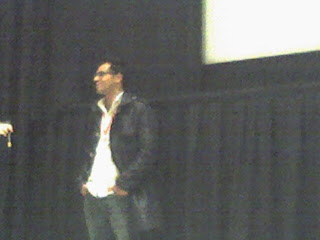
And that's how Asianfest 2008 ends.
First up was a hilarious documentary "Killing of a Chinese Cookie". Did you know fortune cookies aren't Chinese, they're American? In fact, there's debate over where they actually started--Los Angeles or San Francisco--and even what immigrant nationality started them--Chinese or Japanese (there's even a theory that they became associated with Chinese restaurants when all the Japanese Americans were put in camps during WWII). This documentary doesn't really take a stand on that issue. But it is fun, funny, and a weird look at a quintessentially (Asian) American bit of pop culture. It's a fantastic documentary and I had a great time with it...in bed!
Then it was off to Indonesia for "Three Days to Forever", a meandering road movie about kissing cousins. Ambar's sister is getting married. She (Ambar) misses her flight. Luckily her cousin Suf is driving across the country to the wedding, because he has to deliver the traditional set of antique family dishes (on which the bride serves her first meal for her new husband). So Ambar catches a ride with him. Between innumerable wrong turns and cigarettes (most of the tobacco is of the "wacky" variety) they explore the Indonesian countryside, religion (they're Muslim in a predominantly Muslim country, but they do visit a Catholic shrine), growing up, and sex. That last one's the most controversial part. But mostly it wanders through lush Indonesian countryside. And the views (of the countryside, and of Ambar) are quite beautiful.
So from Indonesia I wandered over to Thailand. For most people, if they think of Thai cinema at all they might think of Tony Jaa's fight-heavy but story-poor flicks. But to festival audiences Thai cinema is Wisit Sasanatieng. His first two offerings, "Tears of the Black Tiger" (known as the first pad-thai western) and "Citizen Dog" were hilarious candy-colored visual flights of fantastic imagination. In his third movie, "The Unseeable" he calms down the colors quite a bit and uses an earth-toned yellow-green palette to tell a surprisingly and elegant horror movie. He's working firmly in genre here (he did before, with a western and musical romantic comedy, but here he's more interested in paying homage to the genre than putting the genre through a kaleidoscope), and that genre is a ghost story. Nualjan is a young pregnant woman who's traveling to Bangkok to find her husband. Along the way, she takes work as a maid in an old rundown mansion. Legend has it the mansion used to be grand, and a beautiful woman and her dashing husband lorded over the place. Now the madame is still there, but no mention of what happened to the master. Nualjan takes up residence in the servants quarters with Choy, a very superstitious and talkative servant. She's bossed around by the stern and severe manager. And the mysterious madame is there in the house, but Nualjan isn't allowed to see her. Strange things happen, and the story of the many ghosts on the grounds slowly unfolds, with a very effective surprise ending. Sasanatieng shows mastery of yet a third genre, and although I haven't seen anything else that interests me in Thai cinema, if he's the only filmmaking voice Thailand has to offer it's still pretty damn impressive.
Continuing my pan-Asian tour, I travel to Shanghai (and back in time to the 30's) for "Blood Brothers". A stylish Shanghai gangster noir that pays homage to the genre while adding a solid voice to it, "Blood Brothers" is the story of three simple rural friends. Kang is the tough one, Xiao Hu is his weaker brother, and Fung is their best friend--practically a brother--who actually enjoys their simple country life. But Kang has bigger plans--go to Shanghai, become a waiter at a fancy club, and make their fortune. Fung is hesitant, but wouldn't break up the team. When they get there and fall in with crime/film/nightclub boss Hong, their friendship/brotherhood is put to a harder test. They pull together and despite the blood on their hands things are actually looking good...until the beautiful showgirl gets in the way. It relies a lot on cliches, and it could be argued it doesn't necessarily add anything to the genre. But it does pull through with loads of style, and the standard elements come through as homage more than cliche (at least to me. I talked to some audience members who disagreed).
And finally, back to America, specifically New York in the year 2000 (think dot-com bust) for "Pretty to Think So". Here's something I don't think I've ever seen on screen before--a love triangle between an Indian-American woman, a Korean-American man, and a Chinese-American man. Hannah Shah just got laid off as an investment banker and is unemployed in Manhattan. On a night drinking and commiserating with her (still employed) investment banker friend, she meets Jiwon Kim. He's a successful corporate lawyer, unaffected by the dot-bomb, and they start dating. But then she runs into Alex Yuen. He was her childhood friend, back when her family were the only Indians in New York's Chinatown. He had an abusive father and a gambling problem, and ran away when he was little. Now he's a youth minister and attending gambling anonymous meetings (and trying to avoid the free shuttles to Atlantic City). To complicate matters futher Alex is Jiwon's client (renegotiating the lease on their building). There's even some violence as Alex can't escape his difficult path, although the violence seems somewhat out of place in this movie. All in all, it's an interesting look at the time and place and fears associated with the dot-com bust and with growing up, love, and escaping your path. A fine end to the festival. Here's a pic of producer Balaji Srinivasan:

And that's how Asianfest 2008 ends.
Jason goes to Asianfest--Day 10
Okay, SFIAAFF has been over for a couple of days now, I have 10 last movies to write up, so let's just do it. Here we go.
First up on Saturday was the documentary "Wings of Defeat", about Japanese kamikaze pilots in WWII. Japanese American director Risa Morimoto was brought up to believe that the kamikaze were fanatics on the fringe, but later learned that her uncle Toshio had trained as a kamikaze. He never completed a suicide mission, and grew up to be the kind, friendly uncle she knew. This, of course, went against everything she knew, so she sought out and interviewed surviving kamikaze pilots, and found they were very different from what she thought. Some volunteered, at a time when they were treated like gods. Others were pilots who were later sent to the kamikaze corps. By the end, everyone in Japan was designated kamikaze, meaning they'd fight to death even on the homeland. The interviews are fascinating, and point not to fanaticism but desperation and a bit of hopelessness in the face of authority. More than one admit that if only the emperor wasn't so proud he could've accepted defeat at a lesser price. Some of the more interesting moments: the American sailor (survivor of a kamikaze attack) who offers without hesitation that there were plenty of Americans who would've done the same thing had they been in that situation; the kamikaze pilot who admits--with all due respect to the victims of Hiroshima and Nagasaki--that he's glad the war ended so abruptly before he had to fly his mission; and most amazingly the kamikaze duo who were shot down before reaching their target, turned around, were in the sights of an American fighter...and the Americans let them go--they still want to meet the Americans who they believe saved their lives. A really interesting film.
Then I went from a serious documentary about death to a fun-filled action movie based on the enormously popular manga "Death Note". Light Yagami is a law student. One night he discovers a notebook, inscribed as the Death Note, dropped by the god of death (who does stuff like this for his amusement). The rules are pretty complicated, but in a nutshell whatever name you write in the book, will die (by default in 40 seconds by heart attack, or in the manner you prescribe in the book). As a law student and crusader of justice, Light uses it to kill vicious criminals, and becomes a sensation on the internet going by the name "Kira". Opinion on him is mixed, with most of the young people hailing him as a hero. But the cops regard him as dangerous and put their best man on the case--Light's dad. Oooh...things get tricky, as now he's killing bad guys and cops. But he needs their names to kill them. A mysterious investigator named only "L" gets involved, the cat and mouse game gets really intense, and...it ends with a huge cliffhanger just setting up the sequel ("Death Note: The Last Name", and rumor has it a third one is in production). Now I want to read the manga, check out the animated series, and above all watch the sequel, because the movie was just so exciting and the ending too tempting. Aaaaargh!
Next up was a Filipino American film, "Santa Mesa". It opens with a car crash, where young Hector survives but his single mother does not. A family friend offers to take him in, but instead he's sent to live with his grandmother in the shanty-ish town Manila suburbs (interestingly enough, the Santa Mesa neighborhood is being torn down and the residents relocated, so this is one of the last documents of the neighborhood). Hector doesn't speak Tagalog, his grandmother doesn't speak English, so it's pretty tough going. He falls in with a bit of the wrong crowd (and gets a bit of a crush on the child gang leader's girlfriend Sel). While attempting to rob a random house, he's accosted by the owner, Jose. At first gruff, Jose warms up a bit when he realizes Hector is just a lost kid, and he starts helping Jose find his way and become a photographer. On all fronts, it's a story of missed connections and cultural isolation, but also a story of finding beauty everywhere and learning to walk your own path. This is a first feature from director Rob Morales, and he's done a great job. Hey, here's a picture of him at the Q&A:
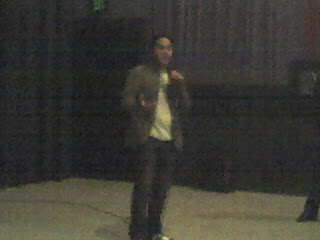
Next up was the somewhat ironically titled Korean melodrama, "Happiness" (come to think of it, I don't know any movie called "Happiness" in which the title isn't at least somewhat ironic). Lim Soo-jung from "I'm a Cyborg but That's Okay" stars again, but this time instead of being a cyborg she has 40% lung capacity and is named Eun-hee. But she again meets romance in an institution. Young-su (Hwang Jung-min) is an alcoholic from Seoul who's girlfriend just dumped him and has just found out he has cirrhosis of the liver. He goes to a wellness clinic in the country, where the instructors immediately tell him that smiling is the best medicine. He's reluctant (in fact, downright grumpy) at first, but he does take a liking Eun-hee, takes a bit better care of himself, and eventually is healthy enough to leave the center and move in with her on a bucolic country estate. Everyone's happy, the end....psych! You see, his alcoholism is always there as much as he hides it. And when his friends from the city come to visit and give him a hard time about being so boring, he's tempted. And on a trip back to the city everything goes to hell again. Hence melodrama, melodrama, melodrama. I'm not normally a big fan of melodrama, and I had some problems with this. But it's beautifully shot and well-acted, and from what I'm told it's one of the less melodramatic of the Korean melodramas. So it's pretty good.
And finally, the night ended with the locally (San Jose) made "Glory Boy Days". A coming-of-age while night ride of intersecting stories. Lando doesn't want to make a big deal about his 21st birthday, and doesn't want to hurt his very sweet girlfriend Amy, but keeps running into a sorority girl who invites him to a party. He'd rather get together at a party at his friend Aces place. Aces roommates have chicken pox, so that's out. B-boys (a festival theme, I missed the Korean movie "Always Be Boyz") Trent and Yardbirds are out to score some meth from Leaker Larry, who offers them a big score if they beat up a skinhead for him. Lars and Friday are a couple...who shouldn't be...or maybe who should be...they don't even know (I bet they just like makeup sex). And it all quickly spirals out of control. Even if you can't follow the entire plot, just enjoy the music, it's pretty cool. Besides, it's not as much about plot as spending time with these interesting characters, on the verge of the end of their glory days and entering (shudder) adulthood.
Here's actor Jared Mendiola (Lando) and director Paul Justin Encinas:
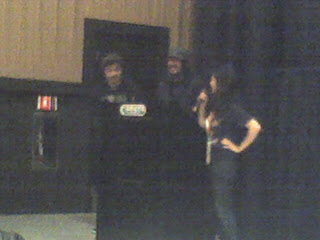
And that was Saturday at Asianfest. One more day to go...
First up on Saturday was the documentary "Wings of Defeat", about Japanese kamikaze pilots in WWII. Japanese American director Risa Morimoto was brought up to believe that the kamikaze were fanatics on the fringe, but later learned that her uncle Toshio had trained as a kamikaze. He never completed a suicide mission, and grew up to be the kind, friendly uncle she knew. This, of course, went against everything she knew, so she sought out and interviewed surviving kamikaze pilots, and found they were very different from what she thought. Some volunteered, at a time when they were treated like gods. Others were pilots who were later sent to the kamikaze corps. By the end, everyone in Japan was designated kamikaze, meaning they'd fight to death even on the homeland. The interviews are fascinating, and point not to fanaticism but desperation and a bit of hopelessness in the face of authority. More than one admit that if only the emperor wasn't so proud he could've accepted defeat at a lesser price. Some of the more interesting moments: the American sailor (survivor of a kamikaze attack) who offers without hesitation that there were plenty of Americans who would've done the same thing had they been in that situation; the kamikaze pilot who admits--with all due respect to the victims of Hiroshima and Nagasaki--that he's glad the war ended so abruptly before he had to fly his mission; and most amazingly the kamikaze duo who were shot down before reaching their target, turned around, were in the sights of an American fighter...and the Americans let them go--they still want to meet the Americans who they believe saved their lives. A really interesting film.
Then I went from a serious documentary about death to a fun-filled action movie based on the enormously popular manga "Death Note". Light Yagami is a law student. One night he discovers a notebook, inscribed as the Death Note, dropped by the god of death (who does stuff like this for his amusement). The rules are pretty complicated, but in a nutshell whatever name you write in the book, will die (by default in 40 seconds by heart attack, or in the manner you prescribe in the book). As a law student and crusader of justice, Light uses it to kill vicious criminals, and becomes a sensation on the internet going by the name "Kira". Opinion on him is mixed, with most of the young people hailing him as a hero. But the cops regard him as dangerous and put their best man on the case--Light's dad. Oooh...things get tricky, as now he's killing bad guys and cops. But he needs their names to kill them. A mysterious investigator named only "L" gets involved, the cat and mouse game gets really intense, and...it ends with a huge cliffhanger just setting up the sequel ("Death Note: The Last Name", and rumor has it a third one is in production). Now I want to read the manga, check out the animated series, and above all watch the sequel, because the movie was just so exciting and the ending too tempting. Aaaaargh!
Next up was a Filipino American film, "Santa Mesa". It opens with a car crash, where young Hector survives but his single mother does not. A family friend offers to take him in, but instead he's sent to live with his grandmother in the shanty-ish town Manila suburbs (interestingly enough, the Santa Mesa neighborhood is being torn down and the residents relocated, so this is one of the last documents of the neighborhood). Hector doesn't speak Tagalog, his grandmother doesn't speak English, so it's pretty tough going. He falls in with a bit of the wrong crowd (and gets a bit of a crush on the child gang leader's girlfriend Sel). While attempting to rob a random house, he's accosted by the owner, Jose. At first gruff, Jose warms up a bit when he realizes Hector is just a lost kid, and he starts helping Jose find his way and become a photographer. On all fronts, it's a story of missed connections and cultural isolation, but also a story of finding beauty everywhere and learning to walk your own path. This is a first feature from director Rob Morales, and he's done a great job. Hey, here's a picture of him at the Q&A:

Next up was the somewhat ironically titled Korean melodrama, "Happiness" (come to think of it, I don't know any movie called "Happiness" in which the title isn't at least somewhat ironic). Lim Soo-jung from "I'm a Cyborg but That's Okay" stars again, but this time instead of being a cyborg she has 40% lung capacity and is named Eun-hee. But she again meets romance in an institution. Young-su (Hwang Jung-min) is an alcoholic from Seoul who's girlfriend just dumped him and has just found out he has cirrhosis of the liver. He goes to a wellness clinic in the country, where the instructors immediately tell him that smiling is the best medicine. He's reluctant (in fact, downright grumpy) at first, but he does take a liking Eun-hee, takes a bit better care of himself, and eventually is healthy enough to leave the center and move in with her on a bucolic country estate. Everyone's happy, the end....psych! You see, his alcoholism is always there as much as he hides it. And when his friends from the city come to visit and give him a hard time about being so boring, he's tempted. And on a trip back to the city everything goes to hell again. Hence melodrama, melodrama, melodrama. I'm not normally a big fan of melodrama, and I had some problems with this. But it's beautifully shot and well-acted, and from what I'm told it's one of the less melodramatic of the Korean melodramas. So it's pretty good.
And finally, the night ended with the locally (San Jose) made "Glory Boy Days". A coming-of-age while night ride of intersecting stories. Lando doesn't want to make a big deal about his 21st birthday, and doesn't want to hurt his very sweet girlfriend Amy, but keeps running into a sorority girl who invites him to a party. He'd rather get together at a party at his friend Aces place. Aces roommates have chicken pox, so that's out. B-boys (a festival theme, I missed the Korean movie "Always Be Boyz") Trent and Yardbirds are out to score some meth from Leaker Larry, who offers them a big score if they beat up a skinhead for him. Lars and Friday are a couple...who shouldn't be...or maybe who should be...they don't even know (I bet they just like makeup sex). And it all quickly spirals out of control. Even if you can't follow the entire plot, just enjoy the music, it's pretty cool. Besides, it's not as much about plot as spending time with these interesting characters, on the verge of the end of their glory days and entering (shudder) adulthood.
Here's actor Jared Mendiola (Lando) and director Paul Justin Encinas:

And that was Saturday at Asianfest. One more day to go...
Jason goes to Asianfest--day 9
Which is the start of the San Jose weekend of the festival. Interesting thing about Asianfest--I always plan my San Jose weekend first. It's easier when there's only 2 screens to choose from (if that), and then I use my choices to narrow down what I'll see in San Francisco. I've done this for the past 3 years, and I've had a pattern of choosing some of my favorite movies in San Jose. Not that I don't have a great time up in SF, but on Thursday when everyone else is talking about "the end of the festival", I know that the best is still to come.
For example, the San Jose opening night gala was "Amal", which was won the jury award for best narrative in San Francisco. Awesome! Wanna hear double awesome--it was previously a short film (by the same director), which I saw (I believe at Cinequest) a couple of years ago, and liked. Wann hear triple awesome--U. S. Congressman Mike Honda (California's 15th district, which is San Jose) was there for the screening and said a few words beforehand:
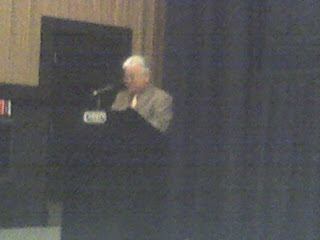
So hows that for rubbing elbows with bigwigs? Oh yeah, and there was a movie. "Amal" is an Indian film (director Richie Mehta is Indian-Canadian, from Toronto) about an autorickshaw driver in Bombay. Amal is proud to drive his rickshaw, proud to give his customers a good, fair deal, and make a humble living with his mother, a few friends, and his regular customers. In fact, his pride is so great that when a beggar girl steals a purse from his passenger, he chases her into traffic, where she's hit by a car and hospitalized. Feeling guilty, he visits her every day, but doesn't have the 50,000 rupees to pay for the operation she needs. Meanwhile, there's a grumpy old eccentric man (Naseeruddin Shah, in grubby clothes and a superman t-shirt, if you're paying attention). He's rude to everyone he meets, but somehow can't break Amal's spirit. Turns out, he's a millionaire looking for one honest man, and as his dying wish instructs his executor to find the autorickshaw driver named Amal and give him a letter explaining that he's leaving him his entire fortune. Well, this pisses off his family, especially his son Vivek who's deeply in debt to the mob. So events transpire (and people conspire) to keep Amal from his rightful fortune, while others try to find him and get him his money. Meanwhile Amal is completely unaware, wrapped up with his own problems with the injured girl, trying to raise money for her operation. And...well, I've said too much already. I'll just say it's a beautiful and moving tribute to the good and simple man, living his life with modest goals.
Here's director Richie Mehta with Vik Sahay (the evil Vivek) at the Q&A:
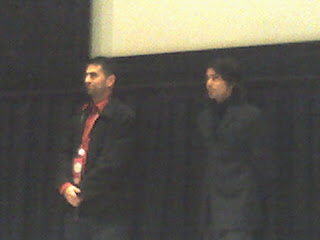
For example, the San Jose opening night gala was "Amal", which was won the jury award for best narrative in San Francisco. Awesome! Wanna hear double awesome--it was previously a short film (by the same director), which I saw (I believe at Cinequest) a couple of years ago, and liked. Wann hear triple awesome--U. S. Congressman Mike Honda (California's 15th district, which is San Jose) was there for the screening and said a few words beforehand:

So hows that for rubbing elbows with bigwigs? Oh yeah, and there was a movie. "Amal" is an Indian film (director Richie Mehta is Indian-Canadian, from Toronto) about an autorickshaw driver in Bombay. Amal is proud to drive his rickshaw, proud to give his customers a good, fair deal, and make a humble living with his mother, a few friends, and his regular customers. In fact, his pride is so great that when a beggar girl steals a purse from his passenger, he chases her into traffic, where she's hit by a car and hospitalized. Feeling guilty, he visits her every day, but doesn't have the 50,000 rupees to pay for the operation she needs. Meanwhile, there's a grumpy old eccentric man (Naseeruddin Shah, in grubby clothes and a superman t-shirt, if you're paying attention). He's rude to everyone he meets, but somehow can't break Amal's spirit. Turns out, he's a millionaire looking for one honest man, and as his dying wish instructs his executor to find the autorickshaw driver named Amal and give him a letter explaining that he's leaving him his entire fortune. Well, this pisses off his family, especially his son Vivek who's deeply in debt to the mob. So events transpire (and people conspire) to keep Amal from his rightful fortune, while others try to find him and get him his money. Meanwhile Amal is completely unaware, wrapped up with his own problems with the injured girl, trying to raise money for her operation. And...well, I've said too much already. I'll just say it's a beautiful and moving tribute to the good and simple man, living his life with modest goals.
Here's director Richie Mehta with Vik Sahay (the evil Vivek) at the Q&A:

Friday, March 21, 2008
Jason goes to Asianfest--Day 8
Which they called closing night, because it closed in San Francisco. But really, at this point I was barely over halfway through. The "closing night" film was my 18th of the festival, and I still had 11 more to see in San Jose.
Anyway, they had a nice ceremony announcing the winners of the jury awards before the film. "Amal" won best narrative, and that's the San Jose opening night film tonight, so that's cool. Then they showed a video of Joan Chen, star of the closing night film (she couldn't be there because she was back in China filming a movie). And finally on to the film.
"Home Song Stories" is a very autobiographical Chinese-Australian movie (and Australia's submission for best foreign picture Oscar). Director Tony Ayres had a pretty strange mother. She's a beautiful nightclub singer named (and by the way, Joan Chen, pushing 47, is still incredibly sexy) who caught the eye of an Australian sailor. Hence she moved there with her kids (Tony and his older sister May) to stay with "Uncle Bill". She marries him...and leaves him one week later. They go back to China, live with a series of "uncles" until she has no choice to go back to Bill. Bill is either a gigantic sap or the nicest man in the world. But they settle in, despite Bill's mother (who lives with him and takes care of the house when he's out at sea) being none too happy. And so when Rose starts an affair with Joe, a much younger man who works at the Chinese restaurant, Bill's mom kicks them out. For the first half of the movie it's actually kind of funny (the wacky adventures of my slutty mom?) But then it starts to get really dark. Rose takes an overdose of sleeping pills and is rushed to the hospital. Joe starts having more of an eye for May than Rose (ick! Mother-daughter love triangles are bad). Rose gets jealous. More pills, more hospitals. And 40 years later Tony is a writer still struggling to understand his mother. It's a miracle he managed to grow up sane. And it's a very powerful movie that started me laughing and left me crying.
Here's a pic of actor Steven Vidler (Bill) with festival director Chi-hui Yang:
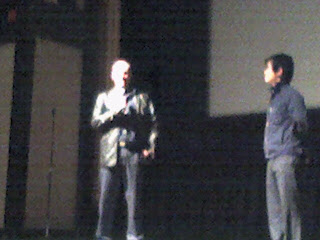
Then it was all over but the awesome closing night party. A few drinks, some good food, chatting with filmmakers and fans.
And now I'm all caught up with this blog. Just in time to go to the Camera 12 for the San Jose opening night.
Anyway, they had a nice ceremony announcing the winners of the jury awards before the film. "Amal" won best narrative, and that's the San Jose opening night film tonight, so that's cool. Then they showed a video of Joan Chen, star of the closing night film (she couldn't be there because she was back in China filming a movie). And finally on to the film.
"Home Song Stories" is a very autobiographical Chinese-Australian movie (and Australia's submission for best foreign picture Oscar). Director Tony Ayres had a pretty strange mother. She's a beautiful nightclub singer named (and by the way, Joan Chen, pushing 47, is still incredibly sexy) who caught the eye of an Australian sailor. Hence she moved there with her kids (Tony and his older sister May) to stay with "Uncle Bill". She marries him...and leaves him one week later. They go back to China, live with a series of "uncles" until she has no choice to go back to Bill. Bill is either a gigantic sap or the nicest man in the world. But they settle in, despite Bill's mother (who lives with him and takes care of the house when he's out at sea) being none too happy. And so when Rose starts an affair with Joe, a much younger man who works at the Chinese restaurant, Bill's mom kicks them out. For the first half of the movie it's actually kind of funny (the wacky adventures of my slutty mom?) But then it starts to get really dark. Rose takes an overdose of sleeping pills and is rushed to the hospital. Joe starts having more of an eye for May than Rose (ick! Mother-daughter love triangles are bad). Rose gets jealous. More pills, more hospitals. And 40 years later Tony is a writer still struggling to understand his mother. It's a miracle he managed to grow up sane. And it's a very powerful movie that started me laughing and left me crying.
Here's a pic of actor Steven Vidler (Bill) with festival director Chi-hui Yang:

Then it was all over but the awesome closing night party. A few drinks, some good food, chatting with filmmakers and fans.
And now I'm all caught up with this blog. Just in time to go to the Camera 12 for the San Jose opening night.
Jason goes to Asianfest--Day 7
Two more movies on Wednesday.
First up was the controversial documentary from China born but Japanese-based director Li Ying. "Yasukuni" is about the Yasukuni shrine where the spirits of the Japanese soldiers who fought for the emperor in WWII are enshrined. This includes several indicted and convicted war criminals, and the existence of the shrine (and especially the visit by Prime Minister Koizumi) are a matter of great tension between China and Japan (so, of course, it's important that a Chinese-Japanese filmmaker made this). The movie is very much cinema-verite, making almost no direct judgment on the shrine. The one behind-the-scenes person interviewed is a sword maker (and a very interesting man), who has made the Yasukuni swords which were used by officers in the war and in which spirits are enshrined. He's very proud of his work, but he's old and the only Yasukuni sword maker left. Other than him, the movie mostly shows people at the shrine, worshiping, and talking about the politics. He did catch on tape one American guy who supports Koizumi and was at the shrine with a sign of support (well received) and an American flag (not well received). He also caught a group of protesters and the ensuing altercation. He uses sparse newspaper clippings to highlight the controversy, but mostly the movie steps back and lets you think. In that regard, it's less like a movie and almost like visiting a shrine--your inner thoughts and feelings are more important than what's presented. Fascinating.
And then I saw what might be my favorite film of the festival so far. It's at least the one I've had the hardest time getting out of my head. "Option 3" is by the same team (Richard Wong and H.P. Mendoza) who made "Colma: the Musical", but it's a very, very different movie. It's a genre-bending thriller with video game logic (to the point of 'get the red key, open the door, get the green key, etc.), dream logic, and bitter heartbroken guy logic. It opens with Ken and Jessica at a restaurant. Jessica asks him what he thinks of what she said (presumably some annoying relationship question). Ken excuses himself to go to the bathroom. When he gets back she's gone, and only a cell phone remains. It rings, he answers, a voice tells him to obey or he'll never see Jessica again, and so the game is on. The thing that makes it so strange (other than the mixing of genres) is that almost everyone involved was apparently going through horrible relationship stuff at the time. They set out to make the movie as maybe some sort of therapy (and in the Q&A, they admitted it totally failed as therapy). But they initially wrote a wacky screwball thriller/comedy. A lot of the comic setups remain, but in shooting and editing they made it much darker and took out all the jokes (or at least don't present them as jokes). So the end result is a wacky adventure/comedy made be people who don't find anything funny anymore. And that might explain why I've met people who didn't like it, but I love it. In fact, the more people I meet who don't like, I know I'm going to like it more.
director Richard Wong, writer H.P. Mendoza, actor Preston Conner (Ken) and actress Theresa Navarro (Jessica):
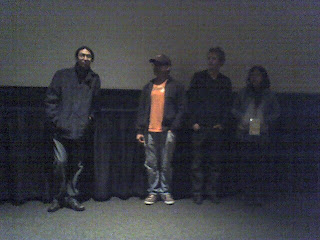
First up was the controversial documentary from China born but Japanese-based director Li Ying. "Yasukuni" is about the Yasukuni shrine where the spirits of the Japanese soldiers who fought for the emperor in WWII are enshrined. This includes several indicted and convicted war criminals, and the existence of the shrine (and especially the visit by Prime Minister Koizumi) are a matter of great tension between China and Japan (so, of course, it's important that a Chinese-Japanese filmmaker made this). The movie is very much cinema-verite, making almost no direct judgment on the shrine. The one behind-the-scenes person interviewed is a sword maker (and a very interesting man), who has made the Yasukuni swords which were used by officers in the war and in which spirits are enshrined. He's very proud of his work, but he's old and the only Yasukuni sword maker left. Other than him, the movie mostly shows people at the shrine, worshiping, and talking about the politics. He did catch on tape one American guy who supports Koizumi and was at the shrine with a sign of support (well received) and an American flag (not well received). He also caught a group of protesters and the ensuing altercation. He uses sparse newspaper clippings to highlight the controversy, but mostly the movie steps back and lets you think. In that regard, it's less like a movie and almost like visiting a shrine--your inner thoughts and feelings are more important than what's presented. Fascinating.
And then I saw what might be my favorite film of the festival so far. It's at least the one I've had the hardest time getting out of my head. "Option 3" is by the same team (Richard Wong and H.P. Mendoza) who made "Colma: the Musical", but it's a very, very different movie. It's a genre-bending thriller with video game logic (to the point of 'get the red key, open the door, get the green key, etc.), dream logic, and bitter heartbroken guy logic. It opens with Ken and Jessica at a restaurant. Jessica asks him what he thinks of what she said (presumably some annoying relationship question). Ken excuses himself to go to the bathroom. When he gets back she's gone, and only a cell phone remains. It rings, he answers, a voice tells him to obey or he'll never see Jessica again, and so the game is on. The thing that makes it so strange (other than the mixing of genres) is that almost everyone involved was apparently going through horrible relationship stuff at the time. They set out to make the movie as maybe some sort of therapy (and in the Q&A, they admitted it totally failed as therapy). But they initially wrote a wacky screwball thriller/comedy. A lot of the comic setups remain, but in shooting and editing they made it much darker and took out all the jokes (or at least don't present them as jokes). So the end result is a wacky adventure/comedy made be people who don't find anything funny anymore. And that might explain why I've met people who didn't like it, but I love it. In fact, the more people I meet who don't like, I know I'm going to like it more.
director Richard Wong, writer H.P. Mendoza, actor Preston Conner (Ken) and actress Theresa Navarro (Jessica):

Jason goes to Asianfest--Day 6
Moving along, the first movie I saw on Tuesday was a Filipino gritty hand-held guerrilla-style video, "Slingshot" by Brillante Mendoza. Shot almost exclusively in the slums of Manila, it's about the place as much as the people. The opening scene establishes everything--a frantic race through the slums, people screaming that a police raid is coming, people racing to hide drugs, stolen goods, and themselves. This is the world of the film, and as it moves on we get a taste of their lives. The constant lies and stealing. The drug abuse. The gambling. The starving babies. It's pretty fucking depressing. But there's also a weird side story, barely seen unless you're looking for it. Everywhere there are posters for people running for mayor. The posters themselves (to an American eye) also look more like movie posters than political posters. But as this becomes a running theme, it seems like everyone in town is running for mayor, and no one in the slums pays any attention. No one has a conversation about who to vote for, it's like the election doesn't exist. That is, until just before the election when everyone gets bribed. They like that. I'm not sure if "funny" is a good word to use for this film, but at least that part was brilliantly absurd.
And then I saw yet another tribute to Wayne Wang, and the movie that made me now a full-fledged Wayne Wang fan--"Life is Cheap, But Toilet Paper is Expensive". When he introduced the movie, he claimed it was a companion piece to "Eat a Bowl of Tea" (on my Netflix queue, I haven't seen it yet) and a reaction to shooting that movie in Hong Kong (in 1989, 8 years before the handover from Great Britain to China, and during the Tiananmen Square protests). Spencer Nakasako (who co-wrote and co-directed) stars as an unnamed operative sent from San Francisco to Hong Kong to deliver a briefcase to a triad boss. But he can't find his contact, and instead witnesses a lot of crazy shit (literally...shit). Bizarre and dangerous, with a weird mix of documentary (especially the ritual duck slaughter), mockumentary, and narrative. And an ending that's pretty fucking crazy (and allegedly based on a true story that happened to an actor on "Eat a Bowl of Tea"). This is actually available (in a different cut) as a bonus feature on the special edition DVD of "Chinese Box". So of course I found it on Ebay it right away.
Here's another pic of Wayne Wang:
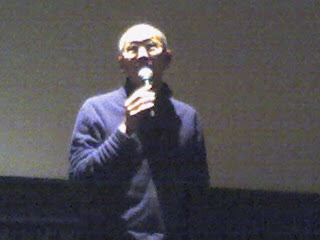
And here's star/co-director/co-writer (and also local filmmaker) Spencer Nakasako:
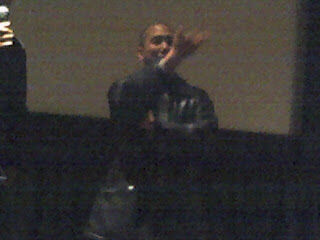
And then I saw yet another tribute to Wayne Wang, and the movie that made me now a full-fledged Wayne Wang fan--"Life is Cheap, But Toilet Paper is Expensive". When he introduced the movie, he claimed it was a companion piece to "Eat a Bowl of Tea" (on my Netflix queue, I haven't seen it yet) and a reaction to shooting that movie in Hong Kong (in 1989, 8 years before the handover from Great Britain to China, and during the Tiananmen Square protests). Spencer Nakasako (who co-wrote and co-directed) stars as an unnamed operative sent from San Francisco to Hong Kong to deliver a briefcase to a triad boss. But he can't find his contact, and instead witnesses a lot of crazy shit (literally...shit). Bizarre and dangerous, with a weird mix of documentary (especially the ritual duck slaughter), mockumentary, and narrative. And an ending that's pretty fucking crazy (and allegedly based on a true story that happened to an actor on "Eat a Bowl of Tea"). This is actually available (in a different cut) as a bonus feature on the special edition DVD of "Chinese Box". So of course I found it on Ebay it right away.
Here's another pic of Wayne Wang:

And here's star/co-director/co-writer (and also local filmmaker) Spencer Nakasako:

Jason goes to Asianfest--Day 5
First up on Monday was the quiet, poetic, lazy (in a good way) Japanese ode to simply country life and young love, "A Gentle Breeze in the Village". The story takes place in a country village that's so small the combined elementary/middle school has only six students. Soyo is the oldest, and she's the only one in eighth grade. That is, until Osawa transfers in from Tokyo. His charm and big city attitude stirs things up, especially in the hearts of the girls (and, of course, especially Soyo). This is a beautifully shot movie (nearly everything scene is like a painting), and by not being overly dramatic and loud it focuses instead on the little details--like which path to take to the beach, or why a kiss is different from a handshake--that makes everything so important. It takes its own sweet time (it clocks in at just over 2 hours) and tells its slow, tranquil story, and leaves you with more of a feeling than an idea of what you just saw. Very nice. I suspect if it were the only movie I watched for a few days, it would sink into my heart and mind and never leave. But alas, I'm at a festival, so I'm watching a ton of movies. I wish I had more time to just contemplate it.
Then it was time for one of the highlights of the festival, a sing-along to "Colma: The Musical" This movie premiered at the festival two years ago, and went on to great acclaim (including an Independent Spirit Award nomination). Here's what I wrote about "Colma: The Musical" when I saw it at the premiere two years ago:
And, again, I took the BART away from Colma, to Fremont, and to home.
Then it was time for one of the highlights of the festival, a sing-along to "Colma: The Musical" This movie premiered at the festival two years ago, and went on to great acclaim (including an Independent Spirit Award nomination). Here's what I wrote about "Colma: The Musical" when I saw it at the premiere two years ago:
Next up was a funny, cheesy, corny, but surprisingly thoughtful bit of local culture--"Colma: the Musical". For those who don't know, Colma is a town of about 1.5 million people, nestled snugly in less than 2 square miles between San Francisco and South San Francisco (and sharing a rather blurry boundary with Daly City). How do you fit 1.5 million people in less than 2 square miles? Well, it's remarkably easy when over 99.9% of them are dead. San Francisco has no room for cemeteries, so they put them all in Colma. Other than that, it's a pretty dull suburb, where people sing about how exciting it is that they finally have an In-N-Out and a Krispy Kreme. Anyway, the story circles around three recent high school graduates, Billy, an aspiring actor who never got over his old girlfriend; Rodel, his best friend and crazy gay guy; and Maribel, their cool friend who's more than a little worried that turning 19 might mean they've grown up. Anyway, the story progresses as a meandering line for them to hang musical numbers on, and for such a low budget the songs by H.P. Mendoza (who also plays Rodel) are surprisingly catchy (and the soundtrack is out now on their website, www.colmafilm.com . Anyway, things do happen, Billy gets a local acting job and a new girlfriend, but still can't stop thinking about his ex. Rodel's ex-boyfriend Kevin spills the beans to Rodel's dad, who beats him and kicks him out. And Maribel...stays (like Colma, as described in the opening number "Colma Stays"). Maribel is sort of the stable rock around which all the action swirls. Anyway, as I said in the beginning, it was funny, cheesy, and corny. And also thoughtful, but most of all funny. Especially for people who know a little about Colma. The filmmakers, of course, were there, and answered a few questions before heading off to a bar to party. But I had to catch the BART home (to Fremont, opposite direction of Colma), so I had to be content to just see a fun movie and then go home.Yeah, I'll stand by what I wrote back then. But add that since then the movie also had a limited theatrical run and is now out on DVD. The sing-along cut was apparently slightly different, but I didn't really notice. It's still funny (perhaps even funnier in my mind than it was when I first saw it), and singing along was a blast (it helped I had a martini or two to loosen up). The only complaint is that the acoustics were pretty poor and the movie was loud enough that I couldn't really tell if many people were singing behind me. But I had a great time, and that's all that matters. Director Richard Wong and writer/star H.P. Mendoza were there, but I didn't get a good picture of them. I got a better picture at their other movie in the festival, "Option 3", so look for that a couple of posts from now.
And, again, I took the BART away from Colma, to Fremont, and to home.
Monday, March 17, 2008
Jason goes to Asianfest--Day 4
I'm catching up a bit. Thank god that Good Friday is so early this year, it's a work holiday (officially "Spring Holiday") so I actually got a little rest and a little time to write before the San Jose opening night tonight.
I spent most of Sunday at the Castro theater. First up was "I'm a Cyborg But It's Okay", from Korean madman director Park Chan-wook. What do you get when the director of "Oldboy" makes a romantic comedy? Well, for starters it takes place in an insane asylum. Young-goon (Lim Soo-jung) opens the movie by cutting open her wrist and plugging wires in their. See, she thinks she's a cyborg. It has something to do with her past and her grandmother being dragged away (she thought she was a mouse). In the insane asylum, she refuses to eat, instead just licking batteries for energy. To the rescue comes Il-soon (pop superstar Rain), a kleptomaniac who's terrified he will shrink to nothingness. Obviously he's not there as a doctor. But he's just what she needs, although it takes a lot of time for her to learn it. It's a match made in the strangest, craziest parts of heaven. I loved this movie. I wanna be a cyborg when I grow up (but I want the rice megatron, because I like to eat).
Next up was a crazy, colorful, musical comedy "881" (apparently in Hokkien the title is a pun). It's set in the world of getai--Singaporean musical performances for the gods and spirits during the holy month. It's full of wild costumes and elaborate staging, to please both the seen and unseen audience. The heroes of the movie are the Papaya Sisters (not really sisters, but they met at a getai performance and live like sisters). They're pretty good, but they become great when they visit Auntie Ling's sister, the Goddess of Getai. In exchange for magical singing powers, they must abide by a set of rules--most importantly they can never love or be loved by a man (that's the difficult one to keep). But their success arouses the ire of the evil Durian Sisters, and a fruity girls duel ensues. As I said before, wild, crazy, colorful, musical comedy. Like a box of crayons crammed into your brain.
So after that, I was totally ready for a hard-boiled Koreatown gangster flick. Luckily, that's just what I got with "West 32nd", the spotlight presentation from director Mike Kang (the Motel) and starring John Cho (Harold from "Harold and Kumar"). Cho plays John Kim, a young lawyer looking to make partner by saving a poor Korean kid arrested for killing a Korean gang boss (and, along the way, maybe score with the kids older sister?). Well, he quickly finds himself in the Korean underworld culture of "room salons" (not brothels, just scotch and sexy hostesses), and Korean gang politics. And, of course, he inevitably gets the shit kicked out of him. Two things that really impressed me and make the movie really great. First, by making the outsider to the Korean-American underworld a Korean American, it offers a much more subtle and nuanced exploration of the culture (and the character--this is a Korean American who wants to be more Korean, but doesn't really know how). Second, the violence is palpable and powerful. I've seen bloodier movies, I've seen more shocking movies. But this violence has a fist behind it, if that makes any sense. It's sort of the difference between saying "hey, look at this violence, isn't is cool!" and saying "look at this violence, isn't it violent!" And that, in a way, makes it cooler. Here's a pic of the Q&A with director Mike Kang (far left) and the cast. I won't pretend to know all of the cast, but the one on the left (next to Mike Kang) is John Cho:
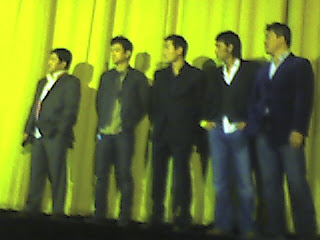
And then, I hopped on a bus from the Castro to the Sundance Kabuki Cinemas for the weird shorts program "Asians in the Claws of Neon Lights":
"Anti Sex"--From Japan, a high school age girl inherits her parents "love hotel". She doesn't really like it, but it's her business now, and maybe she'll learn a few things. Like why do people have sex all the time, at any hour of the day?
"The Bastard"--Animated sketches of a mild mannered office worker who's computer malfunctioned and turned him into a super-villain. Hilarious.
"Manoj"--A mockumentary about an Indian comedian, Manoj, who tells nothing but racist stereotype jokes. Of course, he's a huge hit with the white audiences.
"Beat of a Different Drum"--A little, pudgy Filipino American auditions to be the drummer for a rock band. At least he tried.
"Portfolio"--A Korean satire on artsy film-student cliches. It goes just about everywhere.
"Their Circumstances"--Mmmm...this meat is delicious. Hey, where's my leg!?
"Cookies for Sale"--Buy some, you grumpy old coot!
"The Seed"--Conspiracy, insanity, fighting, hidden enemies. Maybe he's crazy, maybe the world is weirder than you think. Maybe this will be made into a feature--that would be awesome!
Here's a pic of Rey Corpuz (director of "Beat of a Different Drummer") and Wes Kim (director of "Cookies for Sale"):
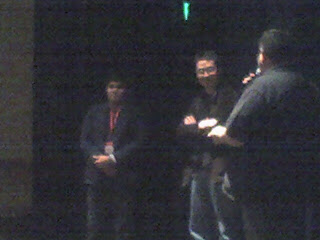
And that was Sunday.
I spent most of Sunday at the Castro theater. First up was "I'm a Cyborg But It's Okay", from Korean madman director Park Chan-wook. What do you get when the director of "Oldboy" makes a romantic comedy? Well, for starters it takes place in an insane asylum. Young-goon (Lim Soo-jung) opens the movie by cutting open her wrist and plugging wires in their. See, she thinks she's a cyborg. It has something to do with her past and her grandmother being dragged away (she thought she was a mouse). In the insane asylum, she refuses to eat, instead just licking batteries for energy. To the rescue comes Il-soon (pop superstar Rain), a kleptomaniac who's terrified he will shrink to nothingness. Obviously he's not there as a doctor. But he's just what she needs, although it takes a lot of time for her to learn it. It's a match made in the strangest, craziest parts of heaven. I loved this movie. I wanna be a cyborg when I grow up (but I want the rice megatron, because I like to eat).
Next up was a crazy, colorful, musical comedy "881" (apparently in Hokkien the title is a pun). It's set in the world of getai--Singaporean musical performances for the gods and spirits during the holy month. It's full of wild costumes and elaborate staging, to please both the seen and unseen audience. The heroes of the movie are the Papaya Sisters (not really sisters, but they met at a getai performance and live like sisters). They're pretty good, but they become great when they visit Auntie Ling's sister, the Goddess of Getai. In exchange for magical singing powers, they must abide by a set of rules--most importantly they can never love or be loved by a man (that's the difficult one to keep). But their success arouses the ire of the evil Durian Sisters, and a fruity girls duel ensues. As I said before, wild, crazy, colorful, musical comedy. Like a box of crayons crammed into your brain.
So after that, I was totally ready for a hard-boiled Koreatown gangster flick. Luckily, that's just what I got with "West 32nd", the spotlight presentation from director Mike Kang (the Motel) and starring John Cho (Harold from "Harold and Kumar"). Cho plays John Kim, a young lawyer looking to make partner by saving a poor Korean kid arrested for killing a Korean gang boss (and, along the way, maybe score with the kids older sister?). Well, he quickly finds himself in the Korean underworld culture of "room salons" (not brothels, just scotch and sexy hostesses), and Korean gang politics. And, of course, he inevitably gets the shit kicked out of him. Two things that really impressed me and make the movie really great. First, by making the outsider to the Korean-American underworld a Korean American, it offers a much more subtle and nuanced exploration of the culture (and the character--this is a Korean American who wants to be more Korean, but doesn't really know how). Second, the violence is palpable and powerful. I've seen bloodier movies, I've seen more shocking movies. But this violence has a fist behind it, if that makes any sense. It's sort of the difference between saying "hey, look at this violence, isn't is cool!" and saying "look at this violence, isn't it violent!" And that, in a way, makes it cooler. Here's a pic of the Q&A with director Mike Kang (far left) and the cast. I won't pretend to know all of the cast, but the one on the left (next to Mike Kang) is John Cho:

And then, I hopped on a bus from the Castro to the Sundance Kabuki Cinemas for the weird shorts program "Asians in the Claws of Neon Lights":
"Anti Sex"--From Japan, a high school age girl inherits her parents "love hotel". She doesn't really like it, but it's her business now, and maybe she'll learn a few things. Like why do people have sex all the time, at any hour of the day?
"The Bastard"--Animated sketches of a mild mannered office worker who's computer malfunctioned and turned him into a super-villain. Hilarious.
"Manoj"--A mockumentary about an Indian comedian, Manoj, who tells nothing but racist stereotype jokes. Of course, he's a huge hit with the white audiences.
"Beat of a Different Drum"--A little, pudgy Filipino American auditions to be the drummer for a rock band. At least he tried.
"Portfolio"--A Korean satire on artsy film-student cliches. It goes just about everywhere.
"Their Circumstances"--Mmmm...this meat is delicious. Hey, where's my leg!?
"Cookies for Sale"--Buy some, you grumpy old coot!
"The Seed"--Conspiracy, insanity, fighting, hidden enemies. Maybe he's crazy, maybe the world is weirder than you think. Maybe this will be made into a feature--that would be awesome!
Here's a pic of Rey Corpuz (director of "Beat of a Different Drummer") and Wes Kim (director of "Cookies for Sale"):

And that was Sunday.
Sunday, March 16, 2008
Jason goes to Asianfest--Day 3
Holy crap, I've been way too busy at work. But I've still been going to movies every night, I just haven't had time to write, I'm about 14 movies behind in my write-ups. So here's a quick shot at last weekend at Asianfest:
First up Saturday was the shorts program "Memory Arcade". Here's the rundown, as best as I can remember 5 days later:
"Recollections"--Half narrative, half documentary, about an old man, reflecting on his life as he prepares for the last moments.
"Silence"--Family...cannot speak.
"The Nothing Pill"--A really cool sci-fi thriller about a scientist attempting to isolate a drug that will cure feelings of isolation.
"Cross Fader"--Fun with audio from the radio, and an unmet love connection.
"Dan Carter"--An old discarded answering machine tape tells the story of Dan Carter, his love affair, and his son.
"24 Frames Per Day"--Experimental film, a fixed, time-lapse shot of a door with audio of a strange, slightly racist taxi ride (includes the question "Indian? Red dot Indian or feather Indian?)
"Pierre-Pierrot"--A Laotian man tries to reconnect with his twin. They were separated during the Vietnamese war.
"Dream of Me"--Filmmaker A. Moon learns she had a sister who died. She searches newspapers on microfilm at the library looking for evidence of her.
"The Chestnut Tree"--A Korean animated film about a mother and a daughter and the chestnut tree where they used to play.
Here's a pic of some of the short filmmakers. I lost my notes, but going from memory and the program guide I believe they are Chihiro Wimbush of "Cross Fader", Allen Ho of "Silence", A. Moon of "Dream of Me", Yu Gu of "The Nothing Pill", and David Oh of "Recollections". But I could be wrong:
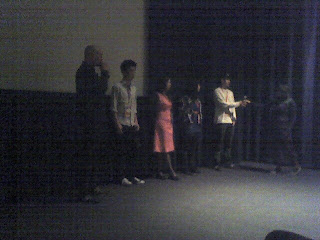
Next up was a break from movies for a conversation with festival honoree Wayne Wang. More of a clip show than a conversation, New York Times film critic Dennis Lim talked to Wayne briefly before Wayne introduced clips from movies that inspired him. Going back to the European New Wave with Godard, Antonioni, etc. and then the Hong Kong swordplay operas of King Hu. The program started a little late, and the clips were long (~5 minutes each), with left very little time for audience questions. But still, it was pretty fun and I'm now solidly a Wayne Wang fan.
"Recollections"--Half narrative, half documentary, about an old man, reflecting on his life as he prepares for the last moments.
"Silence"--Family...cannot speak.
"The Nothing Pill"--A really cool sci-fi thriller about a scientist attempting to isolate a drug that will cure feelings of isolation.
"Cross Fader"--Fun with audio from the radio, and an unmet love connection.
"Dan Carter"--An old discarded answering machine tape tells the story of Dan Carter, his love affair, and his son.
"24 Frames Per Day"--Experimental film, a fixed, time-lapse shot of a door with audio of a strange, slightly racist taxi ride (includes the question "Indian? Red dot Indian or feather Indian?)
"Pierre-Pierrot"--A Laotian man tries to reconnect with his twin. They were separated during the Vietnamese war.
"Dream of Me"--Filmmaker A. Moon learns she had a sister who died. She searches newspapers on microfilm at the library looking for evidence of her.
"The Chestnut Tree"--A Korean animated film about a mother and a daughter and the chestnut tree where they used to play.
Here's a pic of some of the short filmmakers. I lost my notes, but going from memory and the program guide I believe they are Chihiro Wimbush of "Cross Fader", Allen Ho of "Silence", A. Moon of "Dream of Me", Yu Gu of "The Nothing Pill", and David Oh of "Recollections". But I could be wrong:

Next up was a break from movies for a conversation with festival honoree Wayne Wang. More of a clip show than a conversation, New York Times film critic Dennis Lim talked to Wayne briefly before Wayne introduced clips from movies that inspired him. Going back to the European New Wave with Godard, Antonioni, etc. and then the Hong Kong swordplay operas of King Hu. The program started a little late, and the clips were long (~5 minutes each), with left very little time for audience questions. But still, it was pretty fun and I'm now solidly a Wayne Wang fan.
Here's Dennis Lim talking to Wayne Wang.
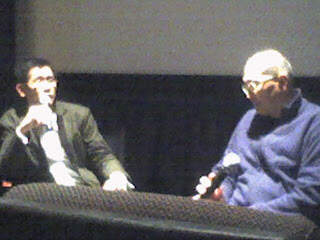
Next up was a wonderful documentary (and, in fact, I'm writing this so late that I already know it went on to win the jury award for best documentary), "Planet B-Boy". Don't call b-boys "breakdancers" (although that's what they are), because that brings up the negative memories of the exploitation and near destruction of their dance form in the 80's. But check them out now, this is not your silly 80's fad. This is wild, this is amazingly athletic, it's intense, it's an art form, and it's a competition. Specifically, the "Battle of the Year" features b-boy crews from around the world--each national champions, vying to be crowned the greatest in the world. The movie follows around a half-dozen teams (basically the teams favored to win) as they prepare, win their national championships, and arrive in Germany for the competition. We follow the Americans (Knucklehead Zoo--from Las Vegas, it's not just a New York thing anymore), the French team (Phase T, featuring a little kid who's easily the youngest b-boy in the movie), the Japanese team (Icheguki, looking to avenge their embarrassment of the previous year) and two Korean teams (the defending champs automatically get in, and a second up-and-coming crew one their national championship). Actually, the second Korean crew (Last For One) are the most compelling. They're almost all living on the borders of poverty, and look to dancing as a means to economic success (the defending champs, Gamblerz, were featured in a Korean tourism ad and make good money performing). The movie is full of jaw-dropping moves, and a good ol' time. I loved it, even though I know nothing of the b-boy scene (in fact, just getting a taste of it and realizing it's not an 80's joke anymore, is totally worth it). Here's composer Woody Pak, director Benson Lee, and producer Amy Lo:
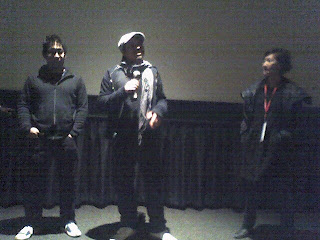
So from a wild, fun documentary I went to a bitter, depressing documentary. "Behind Forgotten Eyes" tells the story of the "comfort women" enslaved to the Japanese forces during WWII. After the Rape of Nanking, the Japanese military realized something needed to be changed to prevent these rapes. After all, the STD problem was becoming unmanageable. So they built a series of
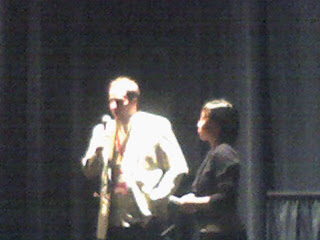
And finally, the last show of Saturday was the shorts program "Let's Get Outta Here" (about escaping, or trying to). Here's the rundown:
"Little Forest"--A cool extremely short animated film about a tree, it's roots, and a fierce little girl.
"Souvenirs From Asia"--A complex comedy about Asian adoptees. In this case, the daughter feels like she's shown off like a souvenir. Escape from your family.
"Smile"--Another escape from your family movie. This time, about a Chinese American family and the balance of the two cultures. Don't smile in your family portrait, or you'll be showing off to the Chinese relatives how happy you are.
"Graceland"--Thailand...Elvis impersonator...car. Weird.
"Moon Lady"--Escape from sanity? Or escape from an insane mother.
"Giving Care"--Escaping from poverty, from work, to family. A Filipina woman working in America taking care of an elderly man, can't escape back home to give the same care to her own family.
"Triple 8 Palace"--Escape from prostitution. An immigrant girl, sold into sex work to pay off debts. Can't make enough money if she doesn't go all the way.
Here's a pic of some of the filmmakers. From left to right they are (to the best of my knowledge) Maya Bankovic (cinematographer, "Souvenirs From Asia"), Brent Martin (producer, "Souvenirs From Asia"), Joyce Wong (director, "Souvenirs From Asia"), I don't know her name (Asianfest speaker who led the Q&A), Wendy Cheng (director, "Moon Lady"), and Rinee Shah (director, "Little Forest"):
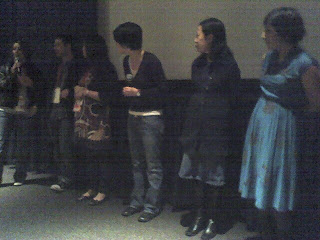
And that was Saturday at Asianfest.
Saturday, March 15, 2008
Jason goes to Asianfest--day 2
Asianfest continued at Berkeley's Pacific Film Archives with the companion piece to opening night's "A Thousand Years of Good Prayers".
"Princess of Nebraska" is also by Wayne Wang, also from Oakland writer Yiyun Li's collection of short stories. It even opens with an echo of "A Thousand Years of Good Prayers", this time with a shot of Oakland airport instead of Spokane airport (interestingly, both give an immediate feel that the hero is not in his or her usual environment. The 'fish out of water' is established immediately). But the two movies are companion pieces more for their differences than their similarities. Most notably, this is not a happy movie (not many laughs. For the people who thought "A Thousand Years of Prayers" was depressing, you're wrong, this is the depressing one). For another, the cinematography (by SFIAAFF alum and co-director Richard Wong) is not the classical, stable shots of age, but the frenetic movement (and imbalance) of youth. Sasha comes from Omaha to the bay area, and we're dropped in the middle of her life not knowing why. We quickly learn that she's pregnant, the father's back in Beijing, and she came to visit Boshen, the father's Caucasian male lover, for advice and support in getting an abortion. But Boshen's got his own ideas--like what an Asian baby, specifically a female, could fetch on the black market (the one child policy has led, and will increasingly lead to Chinese men with no possible Chinese wives). Yeah, this gets pretty creepy, and no less creepy for the night of drinking and prostitution she goes through. All ending, somewhat appropriately, on the St. Stupid's Day parade. You're dropped in her life, and taken out of her life almost as abruptly, with no conclusion but a hell of a lot to think about. Wayne couldn't make it to this screening, but here are actors Brian Danforth (Boshen), Patrice Banaïas (James, Sasha's "client" on her wild night in the city), Li Ling (Sasha), co-director and DP Richard Wong, and CAAM executive director Stephen Gong:
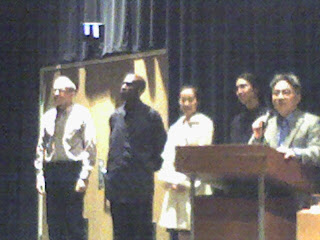
Next up was part of a retrospective tribute to Taiwanese director Edward Yang (who passed away about a year ago). The movie was "The Terrorizer", and it was difficult to digest in one sitting. It opens with a bloody shootout in an apartment building. Again, you're given no chance to get to know the characters before shots ring out. But after the shootout, which ends as abruptly and oddly austerely as it began, the movie becomes about how this violence which ripped briefly through everyone's lives continues to permeate their lives. Friends betray each other, etc. The only problem for me is there were too many characters to follow (which is why I say it's hard to digest in one sitting), so I found myself mostly bored/confused, then punctuated by powerful scenes (especially the ending). I don't know when/if I'll ever have time to watch it again, but I suspect I'd get a lot more out of it the second time.
And that was Friday at Asianfest.
"Princess of Nebraska" is also by Wayne Wang, also from Oakland writer Yiyun Li's collection of short stories. It even opens with an echo of "A Thousand Years of Good Prayers", this time with a shot of Oakland airport instead of Spokane airport (interestingly, both give an immediate feel that the hero is not in his or her usual environment. The 'fish out of water' is established immediately). But the two movies are companion pieces more for their differences than their similarities. Most notably, this is not a happy movie (not many laughs. For the people who thought "A Thousand Years of Prayers" was depressing, you're wrong, this is the depressing one). For another, the cinematography (by SFIAAFF alum and co-director Richard Wong) is not the classical, stable shots of age, but the frenetic movement (and imbalance) of youth. Sasha comes from Omaha to the bay area, and we're dropped in the middle of her life not knowing why. We quickly learn that she's pregnant, the father's back in Beijing, and she came to visit Boshen, the father's Caucasian male lover, for advice and support in getting an abortion. But Boshen's got his own ideas--like what an Asian baby, specifically a female, could fetch on the black market (the one child policy has led, and will increasingly lead to Chinese men with no possible Chinese wives). Yeah, this gets pretty creepy, and no less creepy for the night of drinking and prostitution she goes through. All ending, somewhat appropriately, on the St. Stupid's Day parade. You're dropped in her life, and taken out of her life almost as abruptly, with no conclusion but a hell of a lot to think about. Wayne couldn't make it to this screening, but here are actors Brian Danforth (Boshen), Patrice Banaïas (James, Sasha's "client" on her wild night in the city), Li Ling (Sasha), co-director and DP Richard Wong, and CAAM executive director Stephen Gong:

Next up was part of a retrospective tribute to Taiwanese director Edward Yang (who passed away about a year ago). The movie was "The Terrorizer", and it was difficult to digest in one sitting. It opens with a bloody shootout in an apartment building. Again, you're given no chance to get to know the characters before shots ring out. But after the shootout, which ends as abruptly and oddly austerely as it began, the movie becomes about how this violence which ripped briefly through everyone's lives continues to permeate their lives. Friends betray each other, etc. The only problem for me is there were too many characters to follow (which is why I say it's hard to digest in one sitting), so I found myself mostly bored/confused, then punctuated by powerful scenes (especially the ending). I don't know when/if I'll ever have time to watch it again, but I suspect I'd get a lot more out of it the second time.
And that was Friday at Asianfest.
Friday, March 14, 2008
Jason goes to Asianfest--Opening Night
Okay, it's technically called the San Francisco International Asian American Film Festival (or SFIAAFF, of Sfee-Ahf), presented by the Center for Asian American Media (or CAAM). But I call it Asianfest.
This year, Asianfest is Wayne's world, as the opening night film is from the festival honoree and local filmmaker Wayne Wang (thank you to festival director Chi-hui Yang for that joke. Otherwise I'd have to come up with some joke about Mr. Wang meeting Mr. Wiener, and that can't be good).
Aaaanyway, the movie was "A Thousand Years of Good Prayers", based on a book by Yiyun Li about modern life in China and America. I thought it was very funny. There was a lot of laughter in the theater, but somehow at the after party I kept talking to people who thought it was sad. I'm going with funny. Maybe "bittersweet comedy". Hong Kong actor Henry O plays Mr. Shi, an old Chinese widower who travels to Spokane to visit his daughter Yilan (Feihong Yu), who's working at Gonzaga University. She's recently divorced, and he travels there ostensibly to see America, but really to help her remarry. She's having none of that, and he's left alone in her apartment most of the time. He has odd encounters with Mormons and a hot young talkative lady who wants to be a forensic scientist (he was a rocket scientist, so they have something to talk about). But the soul of the movie is in the broken English chats he has on the park bench with an Iranian widow (Vida Ghahremani). Touching and funny (the best line is his explanation of why he doesn't have a cell phone), she talks about her pride in her grandson. He talks about how he was a bad father (something I'm sure he could never tell his daughter) and how he wishes she'd find the right man so he could have grandchildren. These conversations are echoed in a later line where his daughter explains that in learning a new language you learn to say things you couldn't say in your first language.
Here's a pic of star Henry O (behind the mic) and director Wayne Wang:
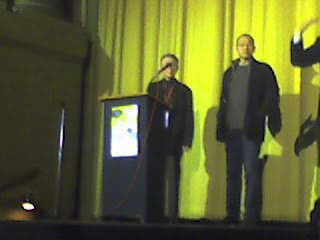
This year, Asianfest is Wayne's world, as the opening night film is from the festival honoree and local filmmaker Wayne Wang (thank you to festival director Chi-hui Yang for that joke. Otherwise I'd have to come up with some joke about Mr. Wang meeting Mr. Wiener, and that can't be good).
Aaaanyway, the movie was "A Thousand Years of Good Prayers", based on a book by Yiyun Li about modern life in China and America. I thought it was very funny. There was a lot of laughter in the theater, but somehow at the after party I kept talking to people who thought it was sad. I'm going with funny. Maybe "bittersweet comedy". Hong Kong actor Henry O plays Mr. Shi, an old Chinese widower who travels to Spokane to visit his daughter Yilan (Feihong Yu), who's working at Gonzaga University. She's recently divorced, and he travels there ostensibly to see America, but really to help her remarry. She's having none of that, and he's left alone in her apartment most of the time. He has odd encounters with Mormons and a hot young talkative lady who wants to be a forensic scientist (he was a rocket scientist, so they have something to talk about). But the soul of the movie is in the broken English chats he has on the park bench with an Iranian widow (Vida Ghahremani). Touching and funny (the best line is his explanation of why he doesn't have a cell phone), she talks about her pride in her grandson. He talks about how he was a bad father (something I'm sure he could never tell his daughter) and how he wishes she'd find the right man so he could have grandchildren. These conversations are echoed in a later line where his daughter explains that in learning a new language you learn to say things you couldn't say in your first language.
Here's a pic of star Henry O (behind the mic) and director Wayne Wang:

By the way, in the Q&A, Wayne Wang revealed that the Mormons in the movie were really Mormons. The ex-CIA apartment manager really was ex-CIA. The bikini-clad wannabe forensic scientist really had studied forensic science (there just weren't enough murders in Spokane for her to get a job, so she's moved to L.A.) This sort of verisimilitude in even the wackiest characters really make the comic elements come to life.
So then it was off to the after party at the Asian Art Museum. Asianfest is famous for having the best food at their after parties. Only problem is, there's always a big crowd around the food. But wait long enough, and it thins out a bit, and I ended up well fed. I do miss the lychee martinis from last year, though...
Anyway, here's to a good start of another week (and a half, since I'm going the the San Jose weekend of it, too) of great Asian and Asian-American films!
Thursday, March 13, 2008
Jason proposes a solution for the FL and MI Democratic primary clusterfuck
Okay, I'm taking an incredibly rare diversion to (sorta) talk about politics. I've tried to keep politics out of this blog, but if you're a regular reader (or know me), you can probably guess my politics.
I should be clear, I am an independent. I am registered with no party (not even a third party). I have voted Democratic before, I've voted Republican before, and I've voted third party before (even Alaskan Independence Party, but I swear I was drunk at the time). So there's absolutely no reason the Democratic Party should listen to anything I say (at least about their internal nomination processes). I should also be clear that I believe the First Amendment right to assembly gives them free reign to choose their candidate however they want. If they want to use a dartboard, I have no complaint about that (although I think it'd make them a joke in November).
I'll also say that I'm not outright opposed to a "do-over" be it with caucuses, a new primary, mail-in voting. I'd be worried about the cost and the precedent, but that shouldn't prevent the Democrats from doing the right thing.
So, with all that said, here's my proposal for Florida and Michigan. Allow their delegates (or a fraction thereof, I see some sense in the Republican solution to seat half their delegation) to vote at the convention, but make them all unpledged delegates. There's a little myth that so-called superdelegates can vote for whoever they want but the pledged delegates must vote for the candidate they're pledged to. In fact, there's nothing legally requiring the pledged delegates to vote for anyone. They're "pledged" by virtue of a super-duper-pinkie-swear promise, and nothing else.
But releasing them from their pledge is only half my solution. The other half is to publicize--online and in local papers--the identities and contact information of all delegates, and encourage citizens to privately petition them to vote certain ways. Obviously bribery and threats would still be illegal, but this would allow people (at least, the people who can get off their ass and write an e-mail or make a phone call) to have their say. And if a delegate doesn't want that kind of attention, he or she can decline to be a delegate and be replaced with someone who is willing to take on the task.
I'm sure there are many, many things wrong with this plan. What are they?
I should be clear, I am an independent. I am registered with no party (not even a third party). I have voted Democratic before, I've voted Republican before, and I've voted third party before (even Alaskan Independence Party, but I swear I was drunk at the time). So there's absolutely no reason the Democratic Party should listen to anything I say (at least about their internal nomination processes). I should also be clear that I believe the First Amendment right to assembly gives them free reign to choose their candidate however they want. If they want to use a dartboard, I have no complaint about that (although I think it'd make them a joke in November).
I'll also say that I'm not outright opposed to a "do-over" be it with caucuses, a new primary, mail-in voting. I'd be worried about the cost and the precedent, but that shouldn't prevent the Democrats from doing the right thing.
So, with all that said, here's my proposal for Florida and Michigan. Allow their delegates (or a fraction thereof, I see some sense in the Republican solution to seat half their delegation) to vote at the convention, but make them all unpledged delegates. There's a little myth that so-called superdelegates can vote for whoever they want but the pledged delegates must vote for the candidate they're pledged to. In fact, there's nothing legally requiring the pledged delegates to vote for anyone. They're "pledged" by virtue of a super-duper-pinkie-swear promise, and nothing else.
But releasing them from their pledge is only half my solution. The other half is to publicize--online and in local papers--the identities and contact information of all delegates, and encourage citizens to privately petition them to vote certain ways. Obviously bribery and threats would still be illegal, but this would allow people (at least, the people who can get off their ass and write an e-mail or make a phone call) to have their say. And if a delegate doesn't want that kind of attention, he or she can decline to be a delegate and be replaced with someone who is willing to take on the task.
I'm sure there are many, many things wrong with this plan. What are they?
Wednesday, March 12, 2008
Jason previews upcoming events--SFIAAFF, Tiburon, Sonoma Valley, SF International...
Okay, Cinequest is over, including my write-ups. So it's time to look forward.
And just in time, because the San Francisco International Asian American Film Festival starts tomorrow! Call it SFIAFF, call it Sfee-Ahf, or call is Asianfest (like I do), it's a great party. And it's the only one coming up I've planned for. Here's my schedule:
I know it might be dangerous to publish exactly where I'll be for the next week and a half, but if anyone attacks me, I figure I'll have learned enough Kung Fu from watching these movies I'll be able to fight them off.
By the way, notice that Cinequest films "Glory Boy Days" and "Amal" are on my schedule. That's specifically why I didn't see them at Cinequest.
If Asian film is not your thing, but you're a fan of peninsulas, the Tiburon Film Festival is going on at the exact same time (March 13-20). Ummm...obviously I won't be there, I'll be at Asianfest. But I will note the films playing there that I've seen: "Becoming John Ford", "Bomb It", "I Hate Musicals" (short), "Off the Grid: Life on the Mesa", "Personal Spectator" (short, and Cinequest award winner), "Row Hard, No Excuses", "Ruby Blue", "Salim Baba" (Oscar nominated short documentary), "Take", "The Stone Child", and "The Toll" (short). I think that's all. If I had to recommend just one of those movies to see, I'd recommend "Row Hard, No Excuses". It's an amazing story.
Well, if you still want to go to the north bay and watch movies, and you're a fan of wine, the Sonoma Valley Film Festival films " is coming up soon (April 9-13). This looks a lot like a mini-Cinequest, even down to giving Michael Keaton an award. And they're playing CinequestAmal", "The Village Barbershop", "The Art of Travel". They're also playing "Row Hard, No Excuses" (man, that film gets around) and 2007 Docfest movie "Golden Days". Good program, and I have it on good authority that there will be plenty of wine and cheese. What there won't be (probably) is me. It's a long way away, so the only way I'd go is to get a group together and rent a hotel there for the weekend. But this year, that Saturday, April 12, is the home opener of my beloved reborn San Jose Earthquakes. I simply can't miss that party, the first true Quakes tailgate in over two years. And as a result I assume I'll be too hung over to make it up for any movies on Sunday, April 13.
With that said, I'd like to make a plea to any of my readers who might be there. You see, for the screening of "The Village Barbershop" (which I totally recommend), John Ratzenberger is actually scheduled to appear. He wasn't at the Cinequest screening, and apparently director Chris Ford heard the joke about the priest and the nun from him. So if you're there, and you get a chance, can you please ask John Ratzenberger how that joke ends, and let me know?
And finally, looking waaaay into the future the big grandaddy, the SF International Film Festival starts April 24 and runs until May 8. The whole schedule isn't up yet, but they have announced the directing award (Mike Leigh) and the opening night film. Normally I don't go to opening night, because it's expensive. But this year the opening film is "The Last Mistress", directed by French director Catherine Breillat, who specializes in explicit sexuality (often female sexuality). That normally would not be quite enough to make me shell out the big money, but this movie also stars my pretend girlfriend Asia Argento. I know the price is steep, but sometimes a guy just has to spend a little on his pretend girlfriend. Otherwise, he doesn't really care and doesn't deserve to pretend to be with her.
See you at the movies!
And just in time, because the San Francisco International Asian American Film Festival starts tomorrow! Call it SFIAFF, call it Sfee-Ahf, or call is Asianfest (like I do), it's a great party. And it's the only one coming up I've planned for. Here's my schedule:
I know it might be dangerous to publish exactly where I'll be for the next week and a half, but if anyone attacks me, I figure I'll have learned enough Kung Fu from watching these movies I'll be able to fight them off.
By the way, notice that Cinequest films "Glory Boy Days" and "Amal" are on my schedule. That's specifically why I didn't see them at Cinequest.
If Asian film is not your thing, but you're a fan of peninsulas, the Tiburon Film Festival is going on at the exact same time (March 13-20). Ummm...obviously I won't be there, I'll be at Asianfest. But I will note the films playing there that I've seen: "Becoming John Ford", "Bomb It", "I Hate Musicals" (short), "Off the Grid: Life on the Mesa", "Personal Spectator" (short, and Cinequest award winner), "Row Hard, No Excuses", "Ruby Blue", "Salim Baba" (Oscar nominated short documentary), "Take", "The Stone Child", and "The Toll" (short). I think that's all. If I had to recommend just one of those movies to see, I'd recommend "Row Hard, No Excuses". It's an amazing story.
Well, if you still want to go to the north bay and watch movies, and you're a fan of wine, the Sonoma Valley Film Festival films " is coming up soon (April 9-13). This looks a lot like a mini-Cinequest, even down to giving Michael Keaton an award. And they're playing CinequestAmal", "The Village Barbershop", "The Art of Travel". They're also playing "Row Hard, No Excuses" (man, that film gets around) and 2007 Docfest movie "Golden Days". Good program, and I have it on good authority that there will be plenty of wine and cheese. What there won't be (probably) is me. It's a long way away, so the only way I'd go is to get a group together and rent a hotel there for the weekend. But this year, that Saturday, April 12, is the home opener of my beloved reborn San Jose Earthquakes. I simply can't miss that party, the first true Quakes tailgate in over two years. And as a result I assume I'll be too hung over to make it up for any movies on Sunday, April 13.
With that said, I'd like to make a plea to any of my readers who might be there. You see, for the screening of "The Village Barbershop" (which I totally recommend), John Ratzenberger is actually scheduled to appear. He wasn't at the Cinequest screening, and apparently director Chris Ford heard the joke about the priest and the nun from him. So if you're there, and you get a chance, can you please ask John Ratzenberger how that joke ends, and let me know?
And finally, looking waaaay into the future the big grandaddy, the SF International Film Festival starts April 24 and runs until May 8. The whole schedule isn't up yet, but they have announced the directing award (Mike Leigh) and the opening night film. Normally I don't go to opening night, because it's expensive. But this year the opening film is "The Last Mistress", directed by French director Catherine Breillat, who specializes in explicit sexuality (often female sexuality). That normally would not be quite enough to make me shell out the big money, but this movie also stars my pretend girlfriend Asia Argento. I know the price is steep, but sometimes a guy just has to spend a little on his pretend girlfriend. Otherwise, he doesn't really care and doesn't deserve to pretend to be with her.
See you at the movies!
Tuesday, March 11, 2008
Jason goes to Cinequest--Day 12
And this is the end of Cinequest 2008. I'm going through a bit of withdrawals. Luckily the SF International Asian American Film Festival (SFIAAFF or Asianfest) starts tomorrow. Anyway, here's the rundown on the final day:
First up was the sci-fi thriller "Suspension", which does a surprising amount with a simple premise and a very low budget. Daniel had a pretty good life, until his wife and son died in a car crash. Sarah had the start of a good life, until her husband died in the same accident (arguably caused by her, since he was distracted by a cell phone call from her). During the accident, Daniel distinctly sees time freeze, but he can't do anything about it. His wife and child still die, and he's stuck in a pit of depression. However, Daniel has always been into repairing things, and he makes it a little project to repair his sons video camera, damaged in the crash. The repaired camera has the magical ability to stop time when he presses the pause button. This power becomes his way of dealing with his grief and controlling the world around him. And when he meets Sarah and becomes infatuated, it becomes his way to anonymously help her with a few things. That is, until he crosses a line and things get really creepy. I'm particularly impressed with how the film deals with the logistics of stopping time. You can still mechanically move things, but you can't engage any automatic or electronic controls. So you can ride a bike, but not drive a car. You can open a lock with a key, but not an electronic key card. I'm also impressed with the special effects, which were not as CGI as you'd expect. Most of them are practical (including the frozen car crash) and overlaying multiple takes with a locked-off camera. Then a little touch-up to paint out fishing line and add spice like bits of flying broken glass, etc. Very impressive, and seamless. And a really well told story. The title can have multiple meanings--suspension of time, suspension of disbelief, suspension of moral boundaries, even suspending objects by fishing line to make them look like time stopped (okay, that last one is a bit of a stretch). Here's a pic of writer/producer Aris Blevins and director Ethan Shaftel:
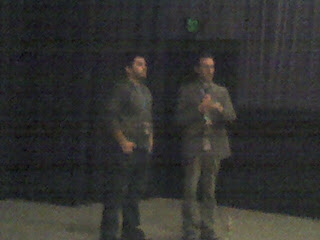
Then I wandered over to the Vuze audience choice for the short "Sharp Cookies". It's a hilarious little story about a young cop and his pot-dealing granny. Loads of fun.
But then I didn't stick around for the feature because I wanted to catch "Goodbye Baby", the coming-of-age comedy about stand-up comedy. Melissa Brooks comes from a comedy-loving family (she was named after Mel Brooks). The movie starts with her and her friends at a post-high school graduation get-together, talking about their plans. Although she talks of going to NYU, the fact is she doesn't have the money for college, so she decides to stay with her gay brother in New York for a while. She really wants to be a standup comedian, but her open mic performance (entirety of the performance: awkward silence..."thank you"...run off stage) shows she's more suited to be a waitress. But a little friendly advice from the club manager, who tells her he learned to speak in public by going to AA (not for the speaking experience, because he was an alcoholic), and she's on a brighter path. But then her brother's boyfriend, an up-and-coming actor who wants to use her as a beard (which gets her into cool premiere parties) complicates her life further. As does the fact that she goes to AA to learn to speak in public, and then meets a nice guy who can easily tell she's not addicted to drugs as she claims. Ultimately, this movie rides on the charming, winning, vulnerable performance by Christine Evangelista, and although there's plenty of laughs, the story is more about her taking control of her life than about the comedy. Here's a pic of writer/director Daniel Schechter and producer Tim Duff:
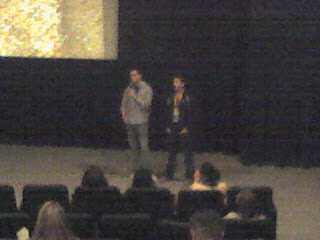
Next up was "Karl Rove, I Love You" which honest to god I believed was a documentary for about half the movie. Well done, guys. Director Phil Lierness starts the movie by completely lying about not knowing who Dan Butler is. He sees Dan Butler as a supporting actor on stage (with Alec Baldwin) doesn't know who he is, then finds out he's been a supporting actor in many of his favorite shows and movies (including "Frasier" and "Silence of the Lambs"). So Phil gets a great idea to make a documentary about the life of a supporting actor, and make it by following Dan Butler around. Dan's hesitant at first, but finally agrees, if for no other reason than to be the star of a movie. Phil also impresses/frightens Dan by interviewing Dan's family and showing him the footage. So they have a movie. The movie's not necessarily going anywhere, since he has no roles coming up, but things take a turn at a party when his politically active friend starts talking about Karl Rove. He doesn't know who Karl Rove is, so she explains a bit about the ruthless political power-broker sometimes called Bush's Brain. And they idly speculate that he'd be a perfect role for Dan. Well, the next morning Dan gets it into his head to run with that idea and make a one-man show, starring himself, about Karl Rove. So he sets out writing it with his co-writer/coach Julia Miranda. They're both politically liberal (at least in the movie, no comment on if his real politics match that), and so they set out skewering and mocking Karl. But Dan's acting coach encourages him to embody Karl Rove rather than just mock him. Make him a real person on stage. And Dan takes that way too far, developing a crush on him (oh yeah, Dan's openly gay, and his partner Richard appears in the movie) and then wanting to actually be Karl Rove. Then things get really really weird. And it was about this time that I started thinking 'this is probably fake, not a real documentary'. And at the point where Dan disappears, apparently to commit suicide, I know it's fake since I saw him introduce the movie. It's absolutely wonderful how this movie kept me guessing all the time what would happen next. And it gets all its political points in early, so turning them on the side and having Dan defend/embody Karl Rove is a strange twist. It suddenly becomes less about politics and more about an actor losing his freakin' mind.
Oh yeah, and they mention a few times that Karl Rove's birthday is Christmas, so I'm counting it as part of the festival birthday theme.
Here's a picture of Richard Waterhouse (actor, Dan's life partner, and coincidentally the director of "Young, Single, and Angry"), Phil Lierness (director), Julia Miranda (co-writer), and Dan Butler (writer/producer/director/star):
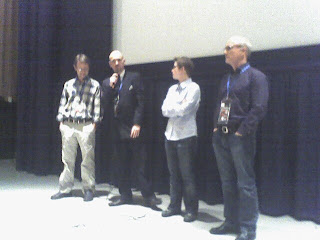
Then the penultimate film (have I mentioned that I like the word "penultimate") of the festival was the charming Czech retirement comedy "Empties". I've noticed another theme of the festival--old people. That fits, apparently if you celebrate enough birthdays, you become old. Writer Zdeněk Svěrák (father of Academy Award winning director Jan Svěrák), stars as Josef. He's old (but his libido is still young) and he no longer has the patience to teach literature, so he quits. But retired life doesn't agree with him, he's too restless. A short stint as a bike messenger doesn't fit him either, but a job at the supermarket reimbursing people for returning empty bottles is just the thing. He's a people person, and he meets all sorts of interesting people there, from his grouchy, quiet co-worker (nicknamed "Chatty", he allegedly tried to kill his wife) to the drunk who returns whole cases at a time, to the lonely woman, to the hot sexy young woman with pen marks on her lower belly, and all other types. Meanwhile, his wife is going nuts that he's not around (she knows full well his predilection to stray). It's a charming, funny, and exciting ride, complete with a ballooning adventure at the end.
Then it was back, one last time, to the fabulous California Theater for the closing night event. Cinequest co-founder and executive director Halfdan Hussey got out to say a few words, but as happens far too often the microphone didn't work right away. So he went back to the lectern and pulled out a megaphone. Good gag, Halfdan!
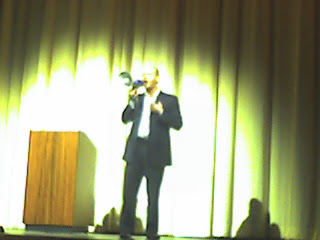
A Cinequest closing night tradition is to get all the remaining filmmakers up on stage. Here's a shot of most of them (there were a lot!)
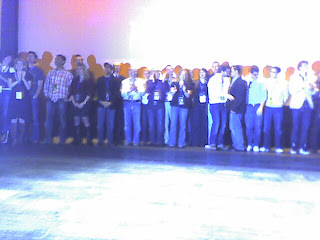
Jury awards were announced at the time. Audience awards were still being tabulated (and closing night is eligible for the audience award). I agree with the Cinequest ethic that all their films are great in one way or another, so who really cares who won, but in any case if you want to see the winners, click here. One little difference this year. In past years, if the winning filmmakers were still present, they'd give a little speech. This year, we simply applauded them and got on with the closing night film.
And so here we are, finally, the closing night film was kind of a downer but very well made. "Take" stars Minnie Driver and Jeremy Renner. We start in the present, with Saul (Renner) in prison, awaiting execution. Cut to Ana (Driver) going to meet Saul. Actually, going to meet him for the second time. The first was the fateful moment seven years ago when Saul robbed a store and killed Ana's little boy. We then go back in time to both their pasts. Saul in trouble for gambling debts while also trying to take care of his sick father. Ana desperately trying to make a living as a maid while struggling with her unruly son (who's not dumb, but is so bad at paying attention that the school wants to put him in special ed). Their respective lives move towards a tragic intersection. Again, this is a depressing subject but it's very well told. The editing is superb, moving from Saul's present to Ana's past to Saul's past to Ana's present fairly nimbly. And the title (which took a long time to arrive at) has multiple meanings--what we take from others, what's been taken from us, and most importantly our take on other people, especially people we meet for only a brief, tragic moment. It's a stretch to say that redemption is reached in this movie--there's still a hell of a lot of ambiguity. But there is a powerful conclusion. I just wish they had chosen to end the festival on a bit of a happier note. Anyway, here's producer Chet Thomas and director Charles Oliver at the final Q&A of Cinequest:
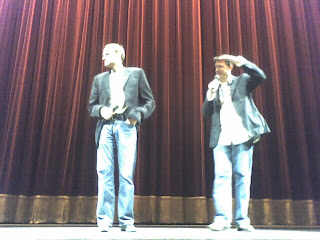
And then it was all over but the drinking, staying out until 2 am, catching a cab home, and coming in to work late on Monday (that was prearranged with my boss, but I didn't volunteer why I'd be late).
And that's it, thank you to all the people who made Cinequest so awesome this year. The staff, the volunteers, the filmmakers, and all the great people I met. I guess it's because a few people actually read this blog, but this was the first time I actually felt famous instead of just well-known at Cinequest. And that really brought the whole experience to the next level.
I suppose I should say something about my favorite films this year. Again, I loved nearly all the films I saw, but by the end my mind was fixating on the really weird ones--"The End", "The Aerial", "Anywhere, U.S.A.", "Suspension". And there's also the ones from early on that stuck in my mind through the whole festival--"The Art of Travel", "Eternal City". Even the depressing or freaky ones that impressed me--"Dear Zachary" (I still mean to write that letter to the Canadian AG), "The Trap" (congratulations on the Global Vision award), "The Case". Or the ones that made me laugh the most--"Sherman's Way", "The Village Barbershop", "Speed Dating", "Young People Fucking", "Who Is K. K. Downey?". And I know there are others I'm forgetting at the moment. Weeks or even years from now someone might say something that reminds me of a film I saw in the past week and a half. I know when that happens, that was a great film, because it stuck with me.
First up was the sci-fi thriller "Suspension", which does a surprising amount with a simple premise and a very low budget. Daniel had a pretty good life, until his wife and son died in a car crash. Sarah had the start of a good life, until her husband died in the same accident (arguably caused by her, since he was distracted by a cell phone call from her). During the accident, Daniel distinctly sees time freeze, but he can't do anything about it. His wife and child still die, and he's stuck in a pit of depression. However, Daniel has always been into repairing things, and he makes it a little project to repair his sons video camera, damaged in the crash. The repaired camera has the magical ability to stop time when he presses the pause button. This power becomes his way of dealing with his grief and controlling the world around him. And when he meets Sarah and becomes infatuated, it becomes his way to anonymously help her with a few things. That is, until he crosses a line and things get really creepy. I'm particularly impressed with how the film deals with the logistics of stopping time. You can still mechanically move things, but you can't engage any automatic or electronic controls. So you can ride a bike, but not drive a car. You can open a lock with a key, but not an electronic key card. I'm also impressed with the special effects, which were not as CGI as you'd expect. Most of them are practical (including the frozen car crash) and overlaying multiple takes with a locked-off camera. Then a little touch-up to paint out fishing line and add spice like bits of flying broken glass, etc. Very impressive, and seamless. And a really well told story. The title can have multiple meanings--suspension of time, suspension of disbelief, suspension of moral boundaries, even suspending objects by fishing line to make them look like time stopped (okay, that last one is a bit of a stretch). Here's a pic of writer/producer Aris Blevins and director Ethan Shaftel:

Then I wandered over to the Vuze audience choice for the short "Sharp Cookies". It's a hilarious little story about a young cop and his pot-dealing granny. Loads of fun.
But then I didn't stick around for the feature because I wanted to catch "Goodbye Baby", the coming-of-age comedy about stand-up comedy. Melissa Brooks comes from a comedy-loving family (she was named after Mel Brooks). The movie starts with her and her friends at a post-high school graduation get-together, talking about their plans. Although she talks of going to NYU, the fact is she doesn't have the money for college, so she decides to stay with her gay brother in New York for a while. She really wants to be a standup comedian, but her open mic performance (entirety of the performance: awkward silence..."thank you"...run off stage) shows she's more suited to be a waitress. But a little friendly advice from the club manager, who tells her he learned to speak in public by going to AA (not for the speaking experience, because he was an alcoholic), and she's on a brighter path. But then her brother's boyfriend, an up-and-coming actor who wants to use her as a beard (which gets her into cool premiere parties) complicates her life further. As does the fact that she goes to AA to learn to speak in public, and then meets a nice guy who can easily tell she's not addicted to drugs as she claims. Ultimately, this movie rides on the charming, winning, vulnerable performance by Christine Evangelista, and although there's plenty of laughs, the story is more about her taking control of her life than about the comedy. Here's a pic of writer/director Daniel Schechter and producer Tim Duff:

Next up was "Karl Rove, I Love You" which honest to god I believed was a documentary for about half the movie. Well done, guys. Director Phil Lierness starts the movie by completely lying about not knowing who Dan Butler is. He sees Dan Butler as a supporting actor on stage (with Alec Baldwin) doesn't know who he is, then finds out he's been a supporting actor in many of his favorite shows and movies (including "Frasier" and "Silence of the Lambs"). So Phil gets a great idea to make a documentary about the life of a supporting actor, and make it by following Dan Butler around. Dan's hesitant at first, but finally agrees, if for no other reason than to be the star of a movie. Phil also impresses/frightens Dan by interviewing Dan's family and showing him the footage. So they have a movie. The movie's not necessarily going anywhere, since he has no roles coming up, but things take a turn at a party when his politically active friend starts talking about Karl Rove. He doesn't know who Karl Rove is, so she explains a bit about the ruthless political power-broker sometimes called Bush's Brain. And they idly speculate that he'd be a perfect role for Dan. Well, the next morning Dan gets it into his head to run with that idea and make a one-man show, starring himself, about Karl Rove. So he sets out writing it with his co-writer/coach Julia Miranda. They're both politically liberal (at least in the movie, no comment on if his real politics match that), and so they set out skewering and mocking Karl. But Dan's acting coach encourages him to embody Karl Rove rather than just mock him. Make him a real person on stage. And Dan takes that way too far, developing a crush on him (oh yeah, Dan's openly gay, and his partner Richard appears in the movie) and then wanting to actually be Karl Rove. Then things get really really weird. And it was about this time that I started thinking 'this is probably fake, not a real documentary'. And at the point where Dan disappears, apparently to commit suicide, I know it's fake since I saw him introduce the movie. It's absolutely wonderful how this movie kept me guessing all the time what would happen next. And it gets all its political points in early, so turning them on the side and having Dan defend/embody Karl Rove is a strange twist. It suddenly becomes less about politics and more about an actor losing his freakin' mind.
Oh yeah, and they mention a few times that Karl Rove's birthday is Christmas, so I'm counting it as part of the festival birthday theme.
Here's a picture of Richard Waterhouse (actor, Dan's life partner, and coincidentally the director of "

Then the penultimate film (have I mentioned that I like the word "penultimate") of the festival was the charming Czech retirement comedy "Empties". I've noticed another theme of the festival--old people. That fits, apparently if you celebrate enough birthdays, you become old. Writer Zdeněk Svěrák (father of Academy Award winning director Jan Svěrák), stars as Josef. He's old (but his libido is still young) and he no longer has the patience to teach literature, so he quits. But retired life doesn't agree with him, he's too restless. A short stint as a bike messenger doesn't fit him either, but a job at the supermarket reimbursing people for returning empty bottles is just the thing. He's a people person, and he meets all sorts of interesting people there, from his grouchy, quiet co-worker (nicknamed "Chatty", he allegedly tried to kill his wife) to the drunk who returns whole cases at a time, to the lonely woman, to the hot sexy young woman with pen marks on her lower belly, and all other types. Meanwhile, his wife is going nuts that he's not around (she knows full well his predilection to stray). It's a charming, funny, and exciting ride, complete with a ballooning adventure at the end.
Then it was back, one last time, to the fabulous California Theater for the closing night event. Cinequest co-founder and executive director Halfdan Hussey got out to say a few words, but as happens far too often the microphone didn't work right away. So he went back to the lectern and pulled out a megaphone. Good gag, Halfdan!

A Cinequest closing night tradition is to get all the remaining filmmakers up on stage. Here's a shot of most of them (there were a lot!)

Jury awards were announced at the time. Audience awards were still being tabulated (and closing night is eligible for the audience award). I agree with the Cinequest ethic that all their films are great in one way or another, so who really cares who won, but in any case if you want to see the winners, click here. One little difference this year. In past years, if the winning filmmakers were still present, they'd give a little speech. This year, we simply applauded them and got on with the closing night film.
And so here we are, finally, the closing night film was kind of a downer but very well made. "Take" stars Minnie Driver and Jeremy Renner. We start in the present, with Saul (Renner) in prison, awaiting execution. Cut to Ana (Driver) going to meet Saul. Actually, going to meet him for the second time. The first was the fateful moment seven years ago when Saul robbed a store and killed Ana's little boy. We then go back in time to both their pasts. Saul in trouble for gambling debts while also trying to take care of his sick father. Ana desperately trying to make a living as a maid while struggling with her unruly son (who's not dumb, but is so bad at paying attention that the school wants to put him in special ed). Their respective lives move towards a tragic intersection. Again, this is a depressing subject but it's very well told. The editing is superb, moving from Saul's present to Ana's past to Saul's past to Ana's present fairly nimbly. And the title (which took a long time to arrive at) has multiple meanings--what we take from others, what's been taken from us, and most importantly our take on other people, especially people we meet for only a brief, tragic moment. It's a stretch to say that redemption is reached in this movie--there's still a hell of a lot of ambiguity. But there is a powerful conclusion. I just wish they had chosen to end the festival on a bit of a happier note. Anyway, here's producer Chet Thomas and director Charles Oliver at the final Q&A of Cinequest:

And then it was all over but the drinking, staying out until 2 am, catching a cab home, and coming in to work late on Monday (that was prearranged with my boss, but I didn't volunteer why I'd be late).
And that's it, thank you to all the people who made Cinequest so awesome this year. The staff, the volunteers, the filmmakers, and all the great people I met. I guess it's because a few people actually read this blog, but this was the first time I actually felt famous instead of just well-known at Cinequest. And that really brought the whole experience to the next level.
I suppose I should say something about my favorite films this year. Again, I loved nearly all the films I saw, but by the end my mind was fixating on the really weird ones--"The End", "The Aerial", "Anywhere, U.S.A.", "Suspension". And there's also the ones from early on that stuck in my mind through the whole festival--"The Art of Travel", "Eternal City". Even the depressing or freaky ones that impressed me--"Dear Zachary" (I still mean to write that letter to the Canadian AG), "The Trap" (congratulations on the Global Vision award), "The Case". Or the ones that made me laugh the most--"Sherman's Way", "The Village Barbershop", "Speed Dating", "Young People Fucking", "Who Is K. K. Downey?". And I know there are others I'm forgetting at the moment. Weeks or even years from now someone might say something that reminds me of a film I saw in the past week and a half. I know when that happens, that was a great film, because it stuck with me.
Subscribe to:
Posts (Atom)
